Organisational Behaviour and Leadership Studies
VerifiedAdded on 2020/10/22
|18
|6041
|154
AI Summary
The assignment consists of various studies and research papers that explore the concepts of organisational behaviour, transformational leadership, social processes of leadership, and prosocial organisational behaviour. The documents include journal articles, book chapters, and online resources that examine the impact of leadership styles on nurse innovation behaviour, employee commitment, and organisational citizenship behaviour. The studies also investigate the effects of trust in organisations and perceived organisational support on organisational citizenship behaviour.
Contribute Materials
Your contribution can guide someone’s learning journey. Share your
documents today.
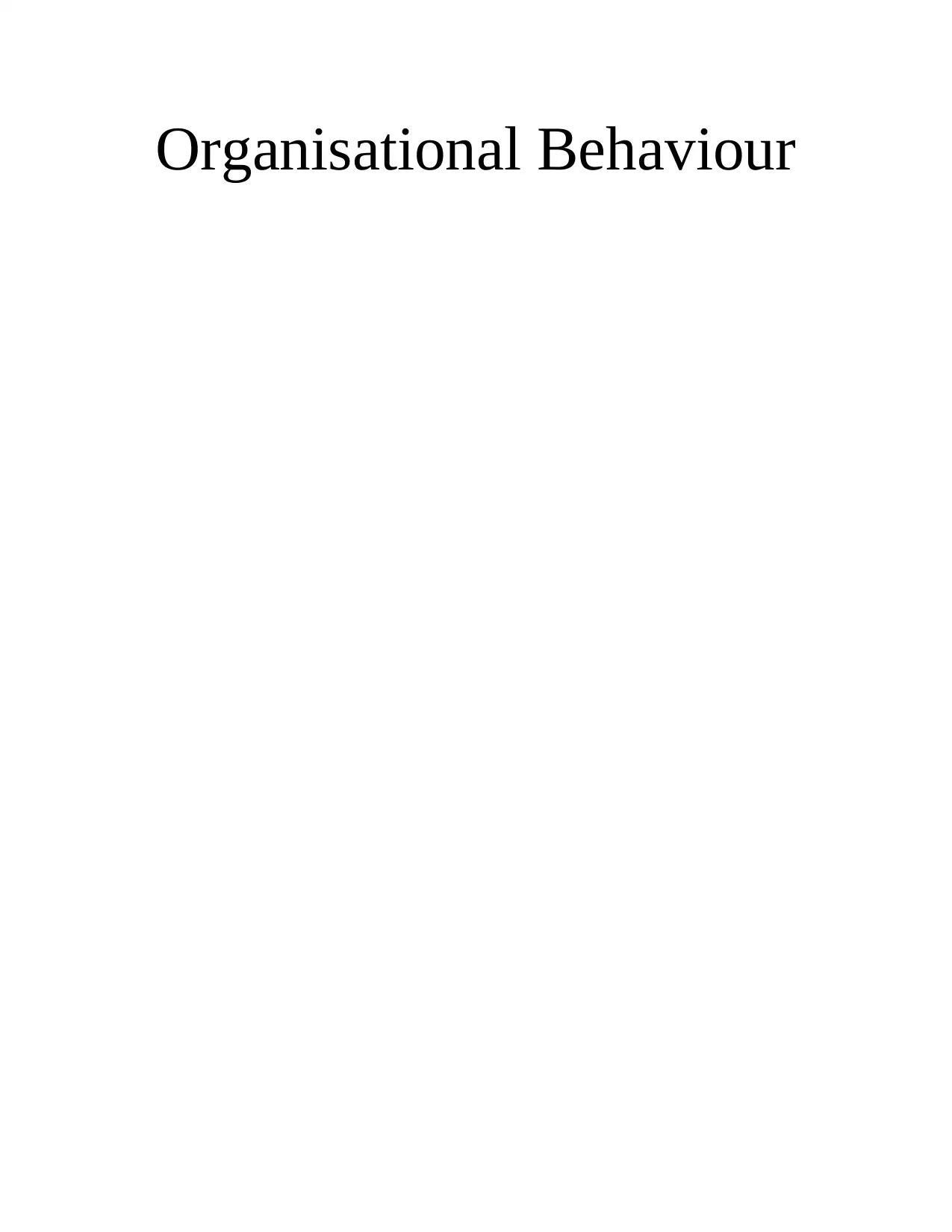
Organisational Behaviour
Secure Best Marks with AI Grader
Need help grading? Try our AI Grader for instant feedback on your assignments.
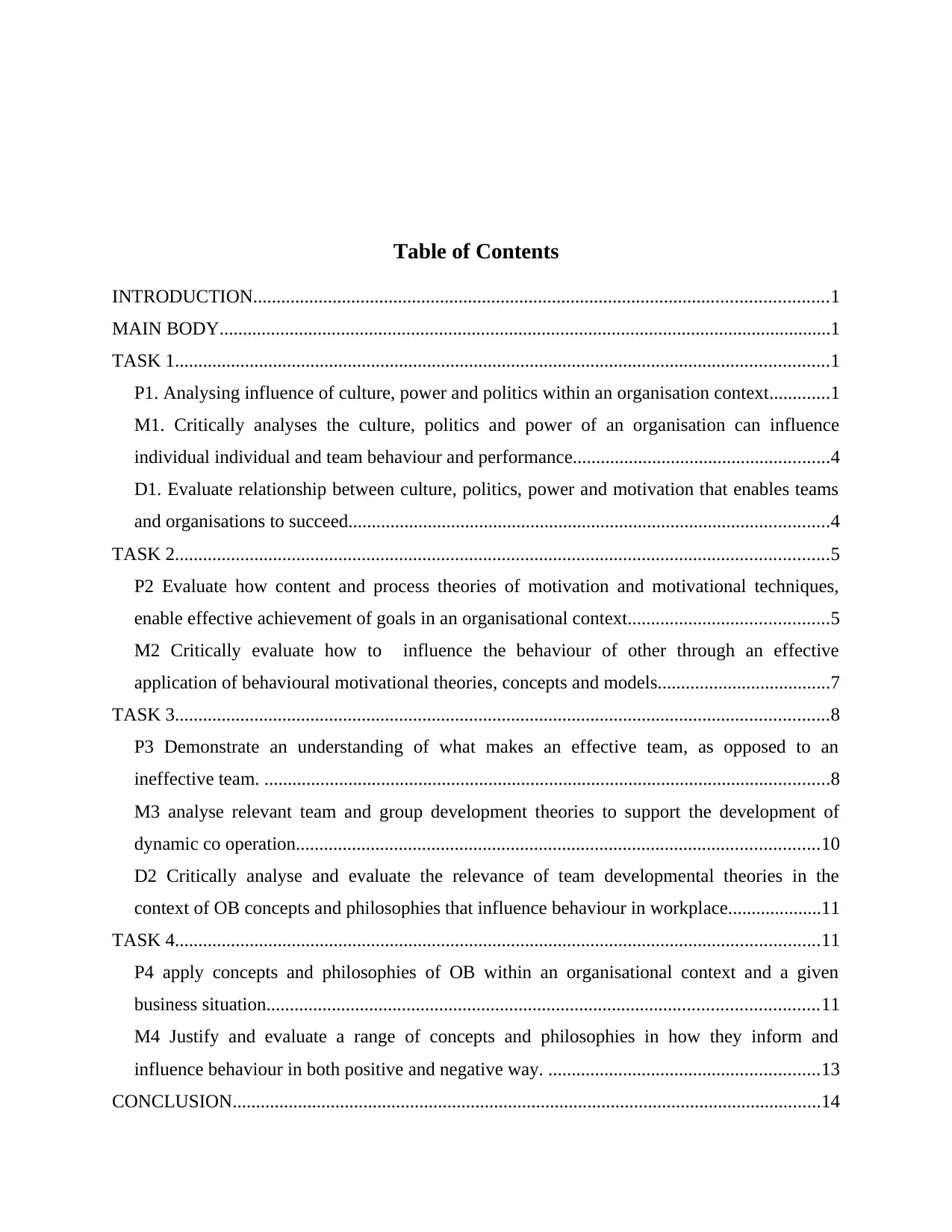
Table of Contents
INTRODUCTION...........................................................................................................................1
MAIN BODY...................................................................................................................................1
TASK 1............................................................................................................................................1
P1. Analysing influence of culture, power and politics within an organisation context.............1
M1. Critically analyses the culture, politics and power of an organisation can influence
individual individual and team behaviour and performance.......................................................4
D1. Evaluate relationship between culture, politics, power and motivation that enables teams
and organisations to succeed.......................................................................................................4
TASK 2............................................................................................................................................5
P2 Evaluate how content and process theories of motivation and motivational techniques,
enable effective achievement of goals in an organisational context...........................................5
M2 Critically evaluate how to influence the behaviour of other through an effective
application of behavioural motivational theories, concepts and models.....................................7
TASK 3............................................................................................................................................8
P3 Demonstrate an understanding of what makes an effective team, as opposed to an
ineffective team. .........................................................................................................................8
M3 analyse relevant team and group development theories to support the development of
dynamic co operation................................................................................................................10
D2 Critically analyse and evaluate the relevance of team developmental theories in the
context of OB concepts and philosophies that influence behaviour in workplace....................11
TASK 4..........................................................................................................................................11
P4 apply concepts and philosophies of OB within an organisational context and a given
business situation......................................................................................................................11
M4 Justify and evaluate a range of concepts and philosophies in how they inform and
influence behaviour in both positive and negative way. ..........................................................13
CONCLUSION..............................................................................................................................14
INTRODUCTION...........................................................................................................................1
MAIN BODY...................................................................................................................................1
TASK 1............................................................................................................................................1
P1. Analysing influence of culture, power and politics within an organisation context.............1
M1. Critically analyses the culture, politics and power of an organisation can influence
individual individual and team behaviour and performance.......................................................4
D1. Evaluate relationship between culture, politics, power and motivation that enables teams
and organisations to succeed.......................................................................................................4
TASK 2............................................................................................................................................5
P2 Evaluate how content and process theories of motivation and motivational techniques,
enable effective achievement of goals in an organisational context...........................................5
M2 Critically evaluate how to influence the behaviour of other through an effective
application of behavioural motivational theories, concepts and models.....................................7
TASK 3............................................................................................................................................8
P3 Demonstrate an understanding of what makes an effective team, as opposed to an
ineffective team. .........................................................................................................................8
M3 analyse relevant team and group development theories to support the development of
dynamic co operation................................................................................................................10
D2 Critically analyse and evaluate the relevance of team developmental theories in the
context of OB concepts and philosophies that influence behaviour in workplace....................11
TASK 4..........................................................................................................................................11
P4 apply concepts and philosophies of OB within an organisational context and a given
business situation......................................................................................................................11
M4 Justify and evaluate a range of concepts and philosophies in how they inform and
influence behaviour in both positive and negative way. ..........................................................13
CONCLUSION..............................................................................................................................14
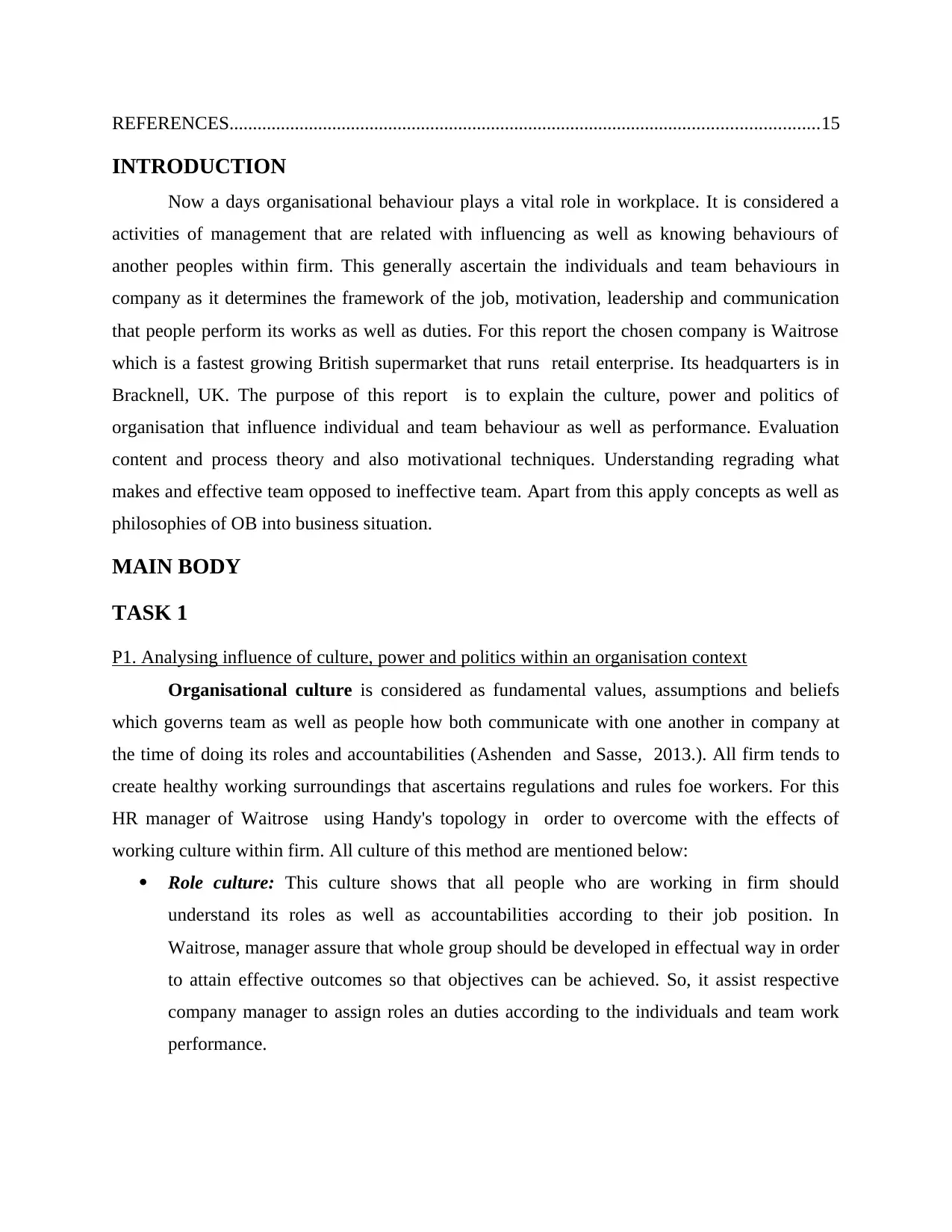
REFERENCES..............................................................................................................................15
INTRODUCTION
Now a days organisational behaviour plays a vital role in workplace. It is considered a
activities of management that are related with influencing as well as knowing behaviours of
another peoples within firm. This generally ascertain the individuals and team behaviours in
company as it determines the framework of the job, motivation, leadership and communication
that people perform its works as well as duties. For this report the chosen company is Waitrose
which is a fastest growing British supermarket that runs retail enterprise. Its headquarters is in
Bracknell, UK. The purpose of this report is to explain the culture, power and politics of
organisation that influence individual and team behaviour as well as performance. Evaluation
content and process theory and also motivational techniques. Understanding regrading what
makes and effective team opposed to ineffective team. Apart from this apply concepts as well as
philosophies of OB into business situation.
MAIN BODY
TASK 1
P1. Analysing influence of culture, power and politics within an organisation context
Organisational culture is considered as fundamental values, assumptions and beliefs
which governs team as well as people how both communicate with one another in company at
the time of doing its roles and accountabilities (Ashenden and Sasse, 2013.). All firm tends to
create healthy working surroundings that ascertains regulations and rules foe workers. For this
HR manager of Waitrose using Handy's topology in order to overcome with the effects of
working culture within firm. All culture of this method are mentioned below:
Role culture: This culture shows that all people who are working in firm should
understand its roles as well as accountabilities according to their job position. In
Waitrose, manager assure that whole group should be developed in effectual way in order
to attain effective outcomes so that objectives can be achieved. So, it assist respective
company manager to assign roles an duties according to the individuals and team work
performance.
INTRODUCTION
Now a days organisational behaviour plays a vital role in workplace. It is considered a
activities of management that are related with influencing as well as knowing behaviours of
another peoples within firm. This generally ascertain the individuals and team behaviours in
company as it determines the framework of the job, motivation, leadership and communication
that people perform its works as well as duties. For this report the chosen company is Waitrose
which is a fastest growing British supermarket that runs retail enterprise. Its headquarters is in
Bracknell, UK. The purpose of this report is to explain the culture, power and politics of
organisation that influence individual and team behaviour as well as performance. Evaluation
content and process theory and also motivational techniques. Understanding regrading what
makes and effective team opposed to ineffective team. Apart from this apply concepts as well as
philosophies of OB into business situation.
MAIN BODY
TASK 1
P1. Analysing influence of culture, power and politics within an organisation context
Organisational culture is considered as fundamental values, assumptions and beliefs
which governs team as well as people how both communicate with one another in company at
the time of doing its roles and accountabilities (Ashenden and Sasse, 2013.). All firm tends to
create healthy working surroundings that ascertains regulations and rules foe workers. For this
HR manager of Waitrose using Handy's topology in order to overcome with the effects of
working culture within firm. All culture of this method are mentioned below:
Role culture: This culture shows that all people who are working in firm should
understand its roles as well as accountabilities according to their job position. In
Waitrose, manager assure that whole group should be developed in effectual way in order
to attain effective outcomes so that objectives can be achieved. So, it assist respective
company manager to assign roles an duties according to the individuals and team work
performance.
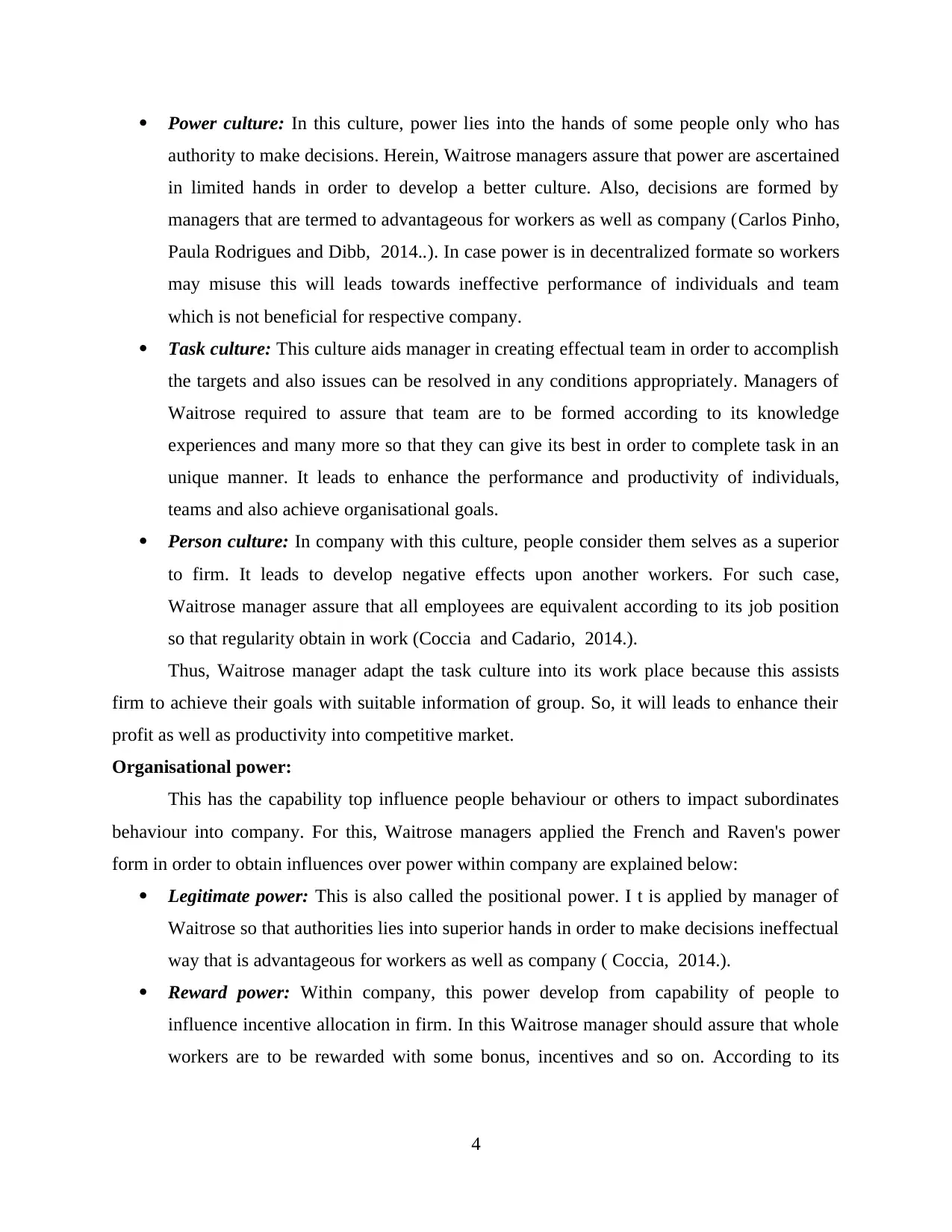
Power culture: In this culture, power lies into the hands of some people only who has
authority to make decisions. Herein, Waitrose managers assure that power are ascertained
in limited hands in order to develop a better culture. Also, decisions are formed by
managers that are termed to advantageous for workers as well as company (Carlos Pinho,
Paula Rodrigues and Dibb, 2014..). In case power is in decentralized formate so workers
may misuse this will leads towards ineffective performance of individuals and team
which is not beneficial for respective company.
Task culture: This culture aids manager in creating effectual team in order to accomplish
the targets and also issues can be resolved in any conditions appropriately. Managers of
Waitrose required to assure that team are to be formed according to its knowledge
experiences and many more so that they can give its best in order to complete task in an
unique manner. It leads to enhance the performance and productivity of individuals,
teams and also achieve organisational goals.
Person culture: In company with this culture, people consider them selves as a superior
to firm. It leads to develop negative effects upon another workers. For such case,
Waitrose manager assure that all employees are equivalent according to its job position
so that regularity obtain in work (Coccia and Cadario, 2014.).
Thus, Waitrose manager adapt the task culture into its work place because this assists
firm to achieve their goals with suitable information of group. So, it will leads to enhance their
profit as well as productivity into competitive market.
Organisational power:
This has the capability top influence people behaviour or others to impact subordinates
behaviour into company. For this, Waitrose managers applied the French and Raven's power
form in order to obtain influences over power within company are explained below:
Legitimate power: This is also called the positional power. I t is applied by manager of
Waitrose so that authorities lies into superior hands in order to make decisions ineffectual
way that is advantageous for workers as well as company ( Coccia, 2014.).
Reward power: Within company, this power develop from capability of people to
influence incentive allocation in firm. In this Waitrose manager should assure that whole
workers are to be rewarded with some bonus, incentives and so on. According to its
4
authority to make decisions. Herein, Waitrose managers assure that power are ascertained
in limited hands in order to develop a better culture. Also, decisions are formed by
managers that are termed to advantageous for workers as well as company (Carlos Pinho,
Paula Rodrigues and Dibb, 2014..). In case power is in decentralized formate so workers
may misuse this will leads towards ineffective performance of individuals and team
which is not beneficial for respective company.
Task culture: This culture aids manager in creating effectual team in order to accomplish
the targets and also issues can be resolved in any conditions appropriately. Managers of
Waitrose required to assure that team are to be formed according to its knowledge
experiences and many more so that they can give its best in order to complete task in an
unique manner. It leads to enhance the performance and productivity of individuals,
teams and also achieve organisational goals.
Person culture: In company with this culture, people consider them selves as a superior
to firm. It leads to develop negative effects upon another workers. For such case,
Waitrose manager assure that all employees are equivalent according to its job position
so that regularity obtain in work (Coccia and Cadario, 2014.).
Thus, Waitrose manager adapt the task culture into its work place because this assists
firm to achieve their goals with suitable information of group. So, it will leads to enhance their
profit as well as productivity into competitive market.
Organisational power:
This has the capability top influence people behaviour or others to impact subordinates
behaviour into company. For this, Waitrose managers applied the French and Raven's power
form in order to obtain influences over power within company are explained below:
Legitimate power: This is also called the positional power. I t is applied by manager of
Waitrose so that authorities lies into superior hands in order to make decisions ineffectual
way that is advantageous for workers as well as company ( Coccia, 2014.).
Reward power: Within company, this power develop from capability of people to
influence incentive allocation in firm. In this Waitrose manager should assure that whole
workers are to be rewarded with some bonus, incentives and so on. According to its
4
Secure Best Marks with AI Grader
Need help grading? Try our AI Grader for instant feedback on your assignments.
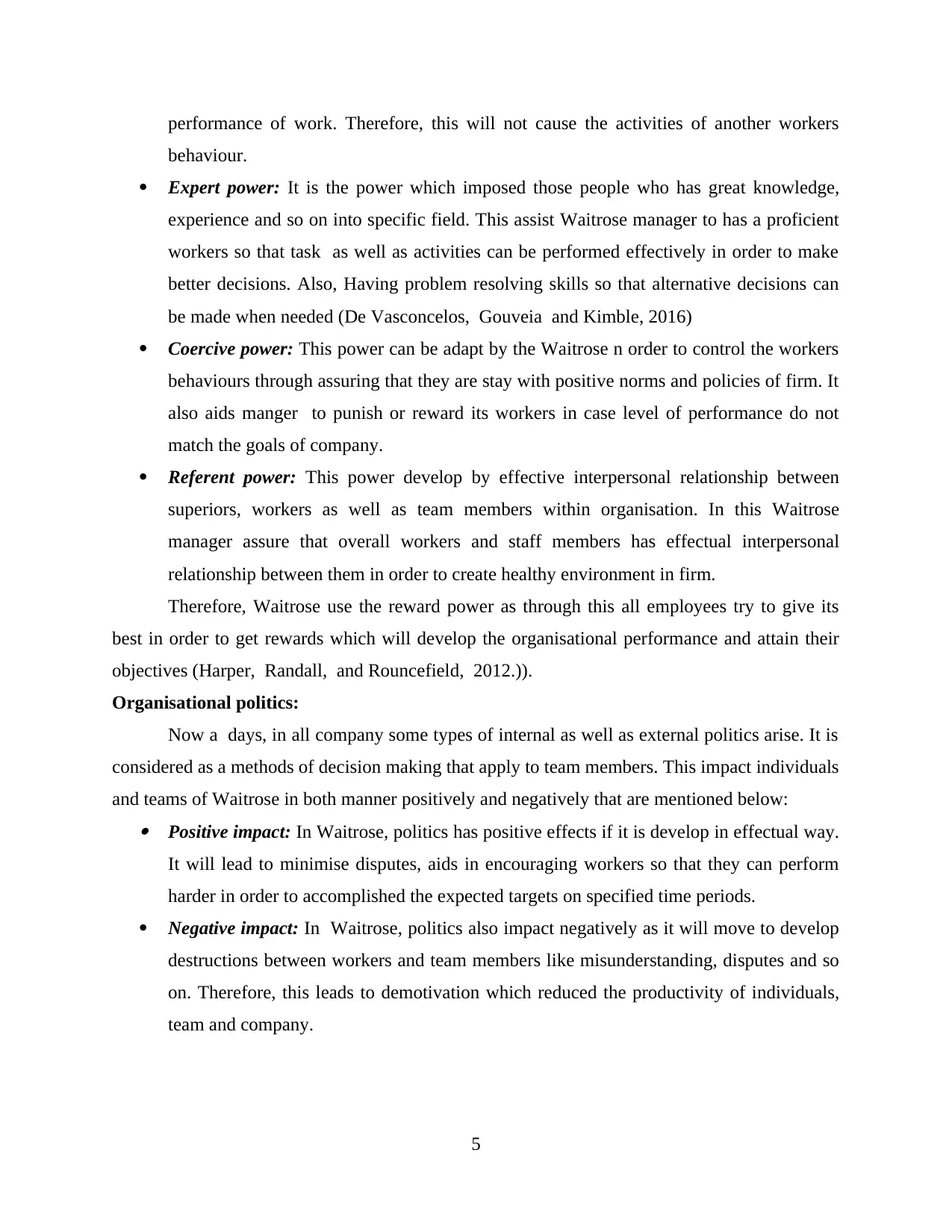
performance of work. Therefore, this will not cause the activities of another workers
behaviour.
Expert power: It is the power which imposed those people who has great knowledge,
experience and so on into specific field. This assist Waitrose manager to has a proficient
workers so that task as well as activities can be performed effectively in order to make
better decisions. Also, Having problem resolving skills so that alternative decisions can
be made when needed (De Vasconcelos, Gouveia and Kimble, 2016)
Coercive power: This power can be adapt by the Waitrose n order to control the workers
behaviours through assuring that they are stay with positive norms and policies of firm. It
also aids manger to punish or reward its workers in case level of performance do not
match the goals of company.
Referent power: This power develop by effective interpersonal relationship between
superiors, workers as well as team members within organisation. In this Waitrose
manager assure that overall workers and staff members has effectual interpersonal
relationship between them in order to create healthy environment in firm.
Therefore, Waitrose use the reward power as through this all employees try to give its
best in order to get rewards which will develop the organisational performance and attain their
objectives (Harper, Randall, and Rouncefield, 2012.)).
Organisational politics:
Now a days, in all company some types of internal as well as external politics arise. It is
considered as a methods of decision making that apply to team members. This impact individuals
and teams of Waitrose in both manner positively and negatively that are mentioned below: Positive impact: In Waitrose, politics has positive effects if it is develop in effectual way.
It will lead to minimise disputes, aids in encouraging workers so that they can perform
harder in order to accomplished the expected targets on specified time periods.
Negative impact: In Waitrose, politics also impact negatively as it will move to develop
destructions between workers and team members like misunderstanding, disputes and so
on. Therefore, this leads to demotivation which reduced the productivity of individuals,
team and company.
5
behaviour.
Expert power: It is the power which imposed those people who has great knowledge,
experience and so on into specific field. This assist Waitrose manager to has a proficient
workers so that task as well as activities can be performed effectively in order to make
better decisions. Also, Having problem resolving skills so that alternative decisions can
be made when needed (De Vasconcelos, Gouveia and Kimble, 2016)
Coercive power: This power can be adapt by the Waitrose n order to control the workers
behaviours through assuring that they are stay with positive norms and policies of firm. It
also aids manger to punish or reward its workers in case level of performance do not
match the goals of company.
Referent power: This power develop by effective interpersonal relationship between
superiors, workers as well as team members within organisation. In this Waitrose
manager assure that overall workers and staff members has effectual interpersonal
relationship between them in order to create healthy environment in firm.
Therefore, Waitrose use the reward power as through this all employees try to give its
best in order to get rewards which will develop the organisational performance and attain their
objectives (Harper, Randall, and Rouncefield, 2012.)).
Organisational politics:
Now a days, in all company some types of internal as well as external politics arise. It is
considered as a methods of decision making that apply to team members. This impact individuals
and teams of Waitrose in both manner positively and negatively that are mentioned below: Positive impact: In Waitrose, politics has positive effects if it is develop in effectual way.
It will lead to minimise disputes, aids in encouraging workers so that they can perform
harder in order to accomplished the expected targets on specified time periods.
Negative impact: In Waitrose, politics also impact negatively as it will move to develop
destructions between workers and team members like misunderstanding, disputes and so
on. Therefore, this leads to demotivation which reduced the productivity of individuals,
team and company.
5
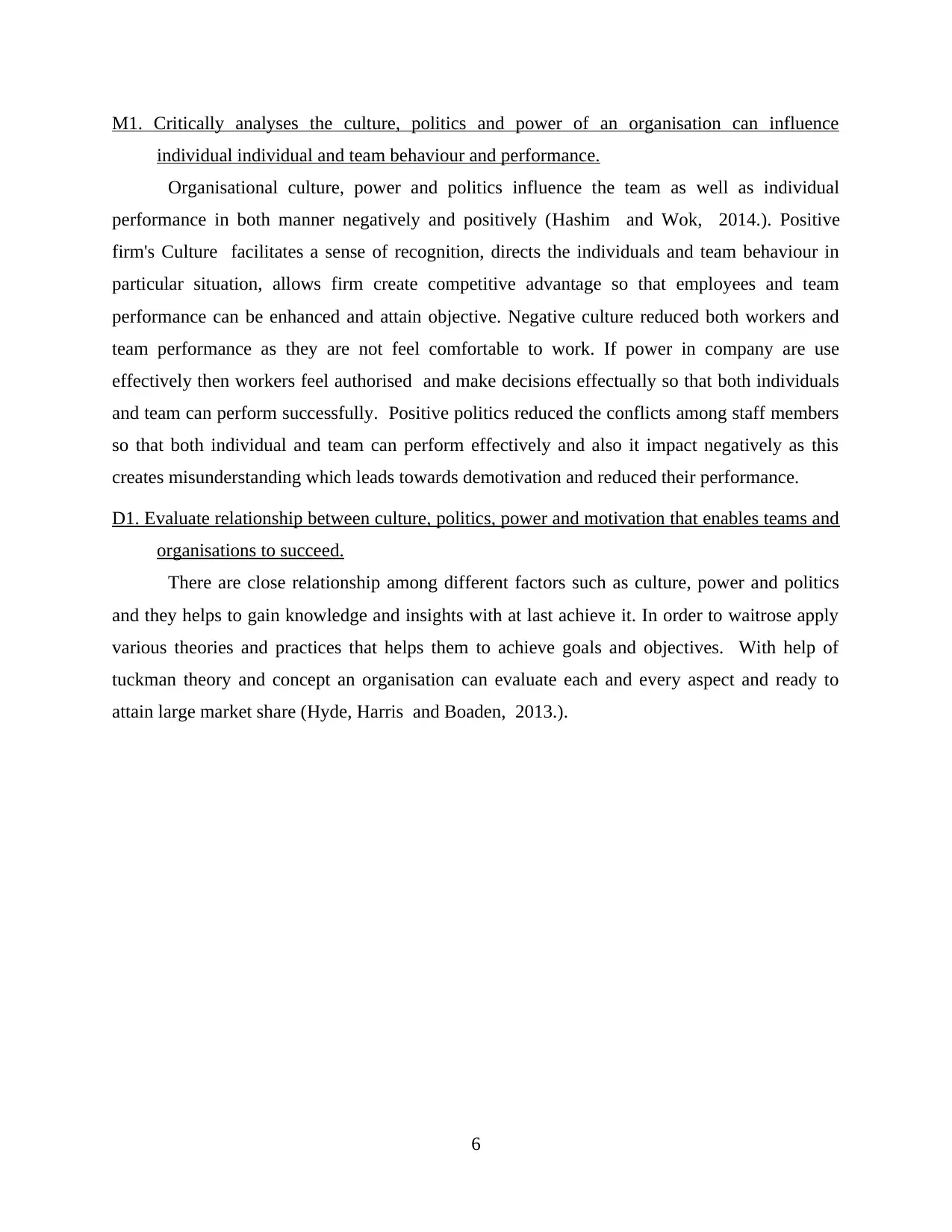
M1. Critically analyses the culture, politics and power of an organisation can influence
individual individual and team behaviour and performance.
Organisational culture, power and politics influence the team as well as individual
performance in both manner negatively and positively (Hashim and Wok, 2014.). Positive
firm's Culture facilitates a sense of recognition, directs the individuals and team behaviour in
particular situation, allows firm create competitive advantage so that employees and team
performance can be enhanced and attain objective. Negative culture reduced both workers and
team performance as they are not feel comfortable to work. If power in company are use
effectively then workers feel authorised and make decisions effectually so that both individuals
and team can perform successfully. Positive politics reduced the conflicts among staff members
so that both individual and team can perform effectively and also it impact negatively as this
creates misunderstanding which leads towards demotivation and reduced their performance.
D1. Evaluate relationship between culture, politics, power and motivation that enables teams and
organisations to succeed.
There are close relationship among different factors such as culture, power and politics
and they helps to gain knowledge and insights with at last achieve it. In order to waitrose apply
various theories and practices that helps them to achieve goals and objectives. With help of
tuckman theory and concept an organisation can evaluate each and every aspect and ready to
attain large market share (Hyde, Harris and Boaden, 2013.).
6
individual individual and team behaviour and performance.
Organisational culture, power and politics influence the team as well as individual
performance in both manner negatively and positively (Hashim and Wok, 2014.). Positive
firm's Culture facilitates a sense of recognition, directs the individuals and team behaviour in
particular situation, allows firm create competitive advantage so that employees and team
performance can be enhanced and attain objective. Negative culture reduced both workers and
team performance as they are not feel comfortable to work. If power in company are use
effectively then workers feel authorised and make decisions effectually so that both individuals
and team can perform successfully. Positive politics reduced the conflicts among staff members
so that both individual and team can perform effectively and also it impact negatively as this
creates misunderstanding which leads towards demotivation and reduced their performance.
D1. Evaluate relationship between culture, politics, power and motivation that enables teams and
organisations to succeed.
There are close relationship among different factors such as culture, power and politics
and they helps to gain knowledge and insights with at last achieve it. In order to waitrose apply
various theories and practices that helps them to achieve goals and objectives. With help of
tuckman theory and concept an organisation can evaluate each and every aspect and ready to
attain large market share (Hyde, Harris and Boaden, 2013.).
6
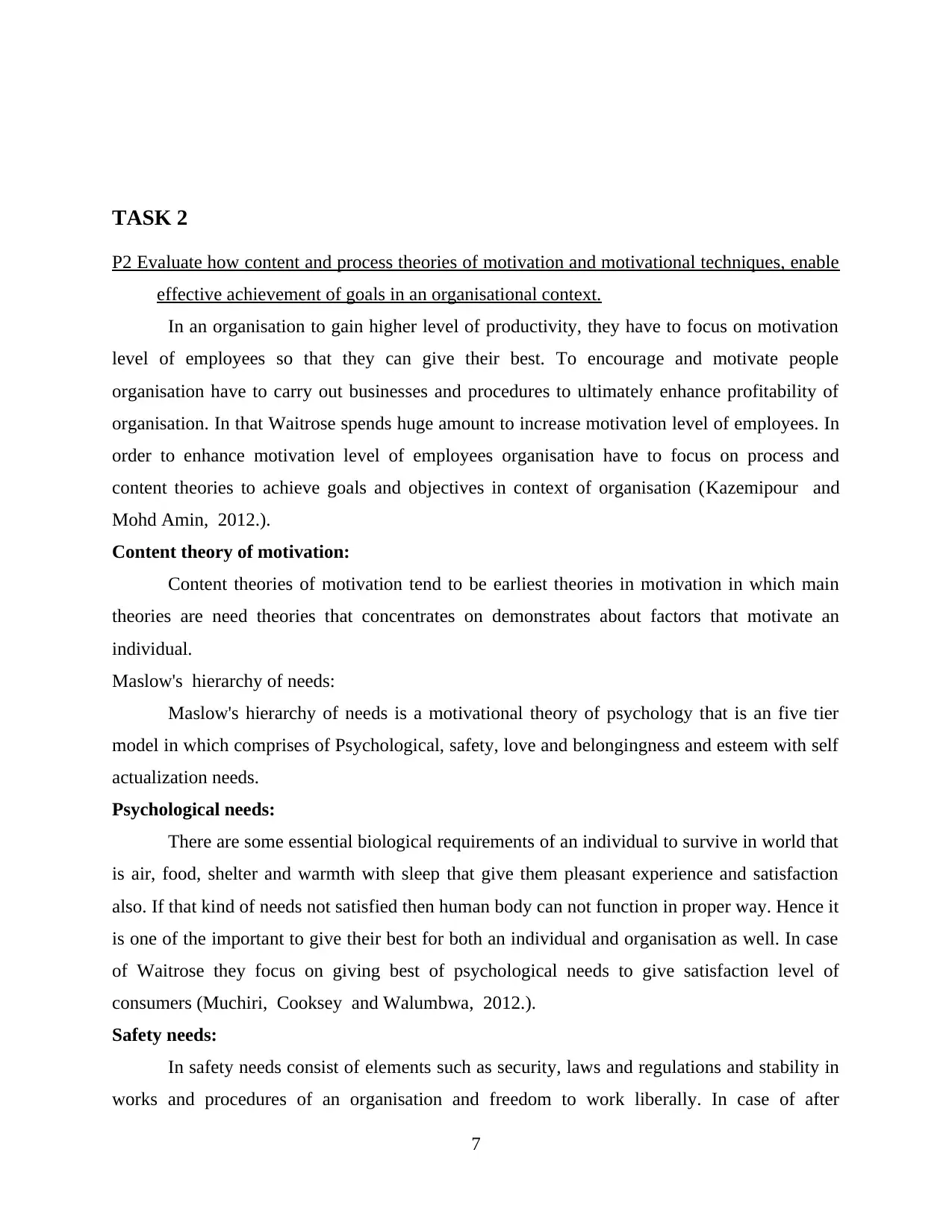
TASK 2
P2 Evaluate how content and process theories of motivation and motivational techniques, enable
effective achievement of goals in an organisational context.
In an organisation to gain higher level of productivity, they have to focus on motivation
level of employees so that they can give their best. To encourage and motivate people
organisation have to carry out businesses and procedures to ultimately enhance profitability of
organisation. In that Waitrose spends huge amount to increase motivation level of employees. In
order to enhance motivation level of employees organisation have to focus on process and
content theories to achieve goals and objectives in context of organisation (Kazemipour and
Mohd Amin, 2012.).
Content theory of motivation:
Content theories of motivation tend to be earliest theories in motivation in which main
theories are need theories that concentrates on demonstrates about factors that motivate an
individual.
Maslow's hierarchy of needs:
Maslow's hierarchy of needs is a motivational theory of psychology that is an five tier
model in which comprises of Psychological, safety, love and belongingness and esteem with self
actualization needs.
Psychological needs:
There are some essential biological requirements of an individual to survive in world that
is air, food, shelter and warmth with sleep that give them pleasant experience and satisfaction
also. If that kind of needs not satisfied then human body can not function in proper way. Hence it
is one of the important to give their best for both an individual and organisation as well. In case
of Waitrose they focus on giving best of psychological needs to give satisfaction level of
consumers (Muchiri, Cooksey and Walumbwa, 2012.).
Safety needs:
In safety needs consist of elements such as security, laws and regulations and stability in
works and procedures of an organisation and freedom to work liberally. In case of after
7
P2 Evaluate how content and process theories of motivation and motivational techniques, enable
effective achievement of goals in an organisational context.
In an organisation to gain higher level of productivity, they have to focus on motivation
level of employees so that they can give their best. To encourage and motivate people
organisation have to carry out businesses and procedures to ultimately enhance profitability of
organisation. In that Waitrose spends huge amount to increase motivation level of employees. In
order to enhance motivation level of employees organisation have to focus on process and
content theories to achieve goals and objectives in context of organisation (Kazemipour and
Mohd Amin, 2012.).
Content theory of motivation:
Content theories of motivation tend to be earliest theories in motivation in which main
theories are need theories that concentrates on demonstrates about factors that motivate an
individual.
Maslow's hierarchy of needs:
Maslow's hierarchy of needs is a motivational theory of psychology that is an five tier
model in which comprises of Psychological, safety, love and belongingness and esteem with self
actualization needs.
Psychological needs:
There are some essential biological requirements of an individual to survive in world that
is air, food, shelter and warmth with sleep that give them pleasant experience and satisfaction
also. If that kind of needs not satisfied then human body can not function in proper way. Hence it
is one of the important to give their best for both an individual and organisation as well. In case
of Waitrose they focus on giving best of psychological needs to give satisfaction level of
consumers (Muchiri, Cooksey and Walumbwa, 2012.).
Safety needs:
In safety needs consist of elements such as security, laws and regulations and stability in
works and procedures of an organisation and freedom to work liberally. In case of after
7
Paraphrase This Document
Need a fresh take? Get an instant paraphrase of this document with our AI Paraphraser
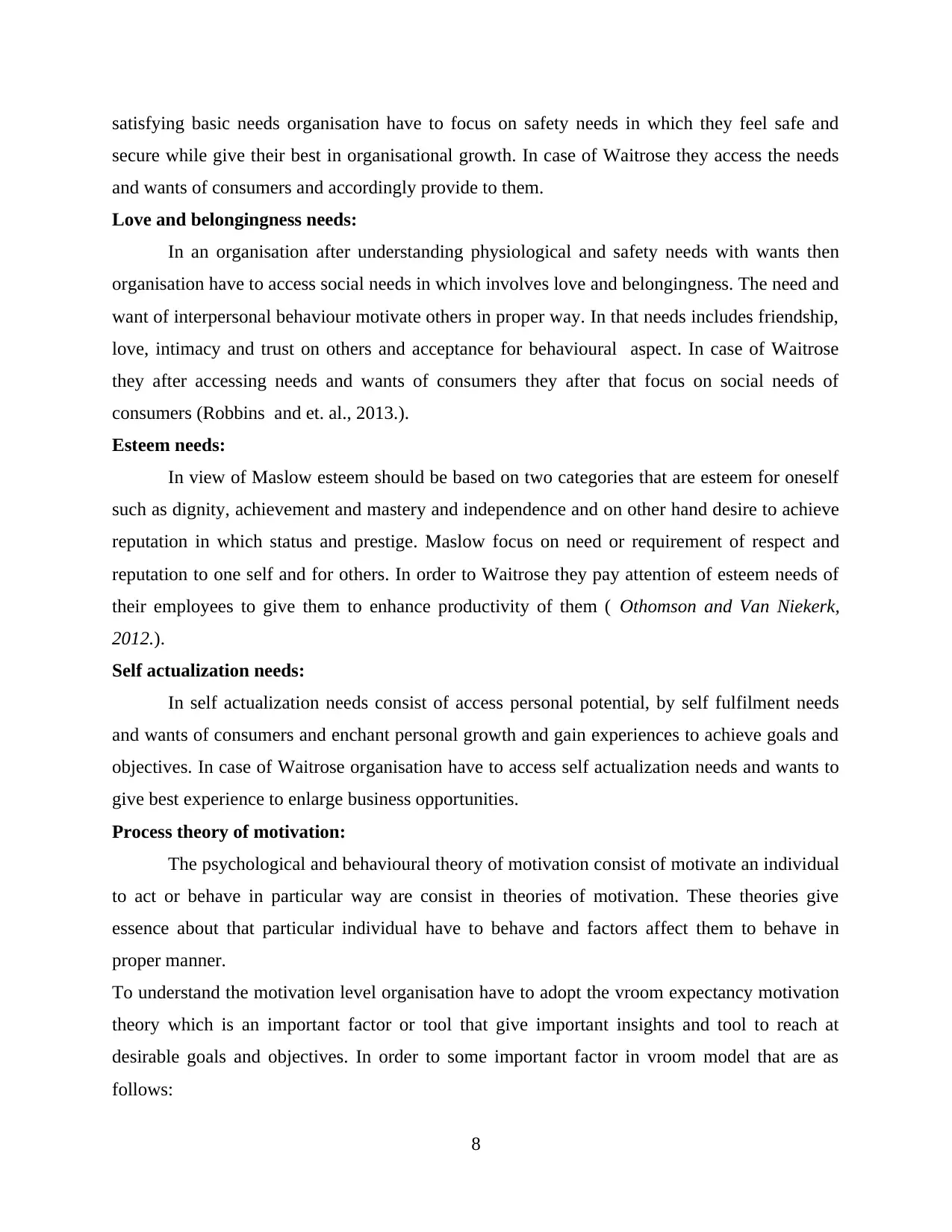
satisfying basic needs organisation have to focus on safety needs in which they feel safe and
secure while give their best in organisational growth. In case of Waitrose they access the needs
and wants of consumers and accordingly provide to them.
Love and belongingness needs:
In an organisation after understanding physiological and safety needs with wants then
organisation have to access social needs in which involves love and belongingness. The need and
want of interpersonal behaviour motivate others in proper way. In that needs includes friendship,
love, intimacy and trust on others and acceptance for behavioural aspect. In case of Waitrose
they after accessing needs and wants of consumers they after that focus on social needs of
consumers (Robbins and et. al., 2013.).
Esteem needs:
In view of Maslow esteem should be based on two categories that are esteem for oneself
such as dignity, achievement and mastery and independence and on other hand desire to achieve
reputation in which status and prestige. Maslow focus on need or requirement of respect and
reputation to one self and for others. In order to Waitrose they pay attention of esteem needs of
their employees to give them to enhance productivity of them ( Othomson and Van Niekerk,
2012.).
Self actualization needs:
In self actualization needs consist of access personal potential, by self fulfilment needs
and wants of consumers and enchant personal growth and gain experiences to achieve goals and
objectives. In case of Waitrose organisation have to access self actualization needs and wants to
give best experience to enlarge business opportunities.
Process theory of motivation:
The psychological and behavioural theory of motivation consist of motivate an individual
to act or behave in particular way are consist in theories of motivation. These theories give
essence about that particular individual have to behave and factors affect them to behave in
proper manner.
To understand the motivation level organisation have to adopt the vroom expectancy motivation
theory which is an important factor or tool that give important insights and tool to reach at
desirable goals and objectives. In order to some important factor in vroom model that are as
follows:
8
secure while give their best in organisational growth. In case of Waitrose they access the needs
and wants of consumers and accordingly provide to them.
Love and belongingness needs:
In an organisation after understanding physiological and safety needs with wants then
organisation have to access social needs in which involves love and belongingness. The need and
want of interpersonal behaviour motivate others in proper way. In that needs includes friendship,
love, intimacy and trust on others and acceptance for behavioural aspect. In case of Waitrose
they after accessing needs and wants of consumers they after that focus on social needs of
consumers (Robbins and et. al., 2013.).
Esteem needs:
In view of Maslow esteem should be based on two categories that are esteem for oneself
such as dignity, achievement and mastery and independence and on other hand desire to achieve
reputation in which status and prestige. Maslow focus on need or requirement of respect and
reputation to one self and for others. In order to Waitrose they pay attention of esteem needs of
their employees to give them to enhance productivity of them ( Othomson and Van Niekerk,
2012.).
Self actualization needs:
In self actualization needs consist of access personal potential, by self fulfilment needs
and wants of consumers and enchant personal growth and gain experiences to achieve goals and
objectives. In case of Waitrose organisation have to access self actualization needs and wants to
give best experience to enlarge business opportunities.
Process theory of motivation:
The psychological and behavioural theory of motivation consist of motivate an individual
to act or behave in particular way are consist in theories of motivation. These theories give
essence about that particular individual have to behave and factors affect them to behave in
proper manner.
To understand the motivation level organisation have to adopt the vroom expectancy motivation
theory which is an important factor or tool that give important insights and tool to reach at
desirable goals and objectives. In order to some important factor in vroom model that are as
follows:
8
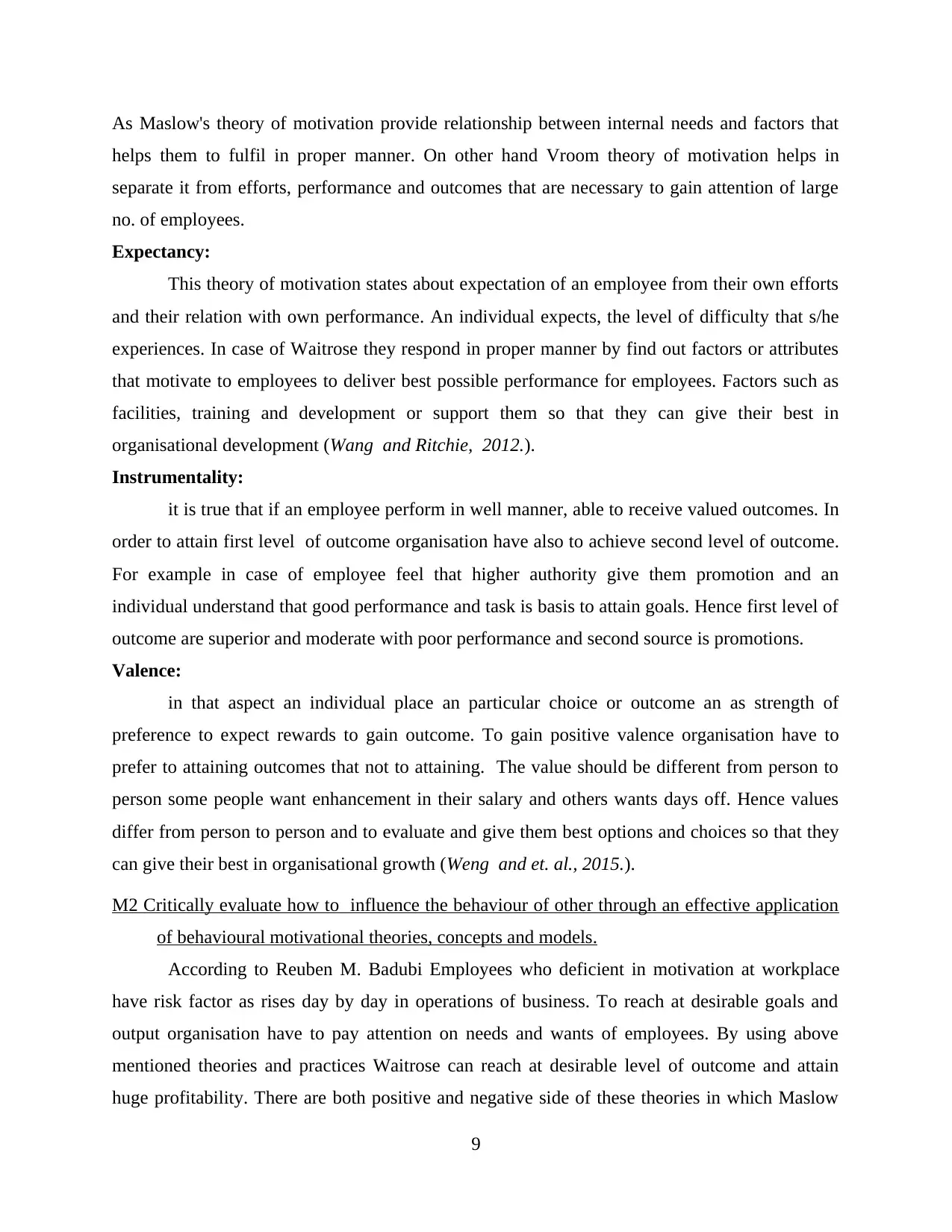
As Maslow's theory of motivation provide relationship between internal needs and factors that
helps them to fulfil in proper manner. On other hand Vroom theory of motivation helps in
separate it from efforts, performance and outcomes that are necessary to gain attention of large
no. of employees.
Expectancy:
This theory of motivation states about expectation of an employee from their own efforts
and their relation with own performance. An individual expects, the level of difficulty that s/he
experiences. In case of Waitrose they respond in proper manner by find out factors or attributes
that motivate to employees to deliver best possible performance for employees. Factors such as
facilities, training and development or support them so that they can give their best in
organisational development (Wang and Ritchie, 2012.).
Instrumentality:
it is true that if an employee perform in well manner, able to receive valued outcomes. In
order to attain first level of outcome organisation have also to achieve second level of outcome.
For example in case of employee feel that higher authority give them promotion and an
individual understand that good performance and task is basis to attain goals. Hence first level of
outcome are superior and moderate with poor performance and second source is promotions.
Valence:
in that aspect an individual place an particular choice or outcome an as strength of
preference to expect rewards to gain outcome. To gain positive valence organisation have to
prefer to attaining outcomes that not to attaining. The value should be different from person to
person some people want enhancement in their salary and others wants days off. Hence values
differ from person to person and to evaluate and give them best options and choices so that they
can give their best in organisational growth (Weng and et. al., 2015.).
M2 Critically evaluate how to influence the behaviour of other through an effective application
of behavioural motivational theories, concepts and models.
According to Reuben M. Badubi Employees who deficient in motivation at workplace
have risk factor as rises day by day in operations of business. To reach at desirable goals and
output organisation have to pay attention on needs and wants of employees. By using above
mentioned theories and practices Waitrose can reach at desirable level of outcome and attain
huge profitability. There are both positive and negative side of these theories in which Maslow
9
helps them to fulfil in proper manner. On other hand Vroom theory of motivation helps in
separate it from efforts, performance and outcomes that are necessary to gain attention of large
no. of employees.
Expectancy:
This theory of motivation states about expectation of an employee from their own efforts
and their relation with own performance. An individual expects, the level of difficulty that s/he
experiences. In case of Waitrose they respond in proper manner by find out factors or attributes
that motivate to employees to deliver best possible performance for employees. Factors such as
facilities, training and development or support them so that they can give their best in
organisational development (Wang and Ritchie, 2012.).
Instrumentality:
it is true that if an employee perform in well manner, able to receive valued outcomes. In
order to attain first level of outcome organisation have also to achieve second level of outcome.
For example in case of employee feel that higher authority give them promotion and an
individual understand that good performance and task is basis to attain goals. Hence first level of
outcome are superior and moderate with poor performance and second source is promotions.
Valence:
in that aspect an individual place an particular choice or outcome an as strength of
preference to expect rewards to gain outcome. To gain positive valence organisation have to
prefer to attaining outcomes that not to attaining. The value should be different from person to
person some people want enhancement in their salary and others wants days off. Hence values
differ from person to person and to evaluate and give them best options and choices so that they
can give their best in organisational growth (Weng and et. al., 2015.).
M2 Critically evaluate how to influence the behaviour of other through an effective application
of behavioural motivational theories, concepts and models.
According to Reuben M. Badubi Employees who deficient in motivation at workplace
have risk factor as rises day by day in operations of business. To reach at desirable goals and
output organisation have to pay attention on needs and wants of employees. By using above
mentioned theories and practices Waitrose can reach at desirable level of outcome and attain
huge profitability. There are both positive and negative side of these theories in which Maslow
9
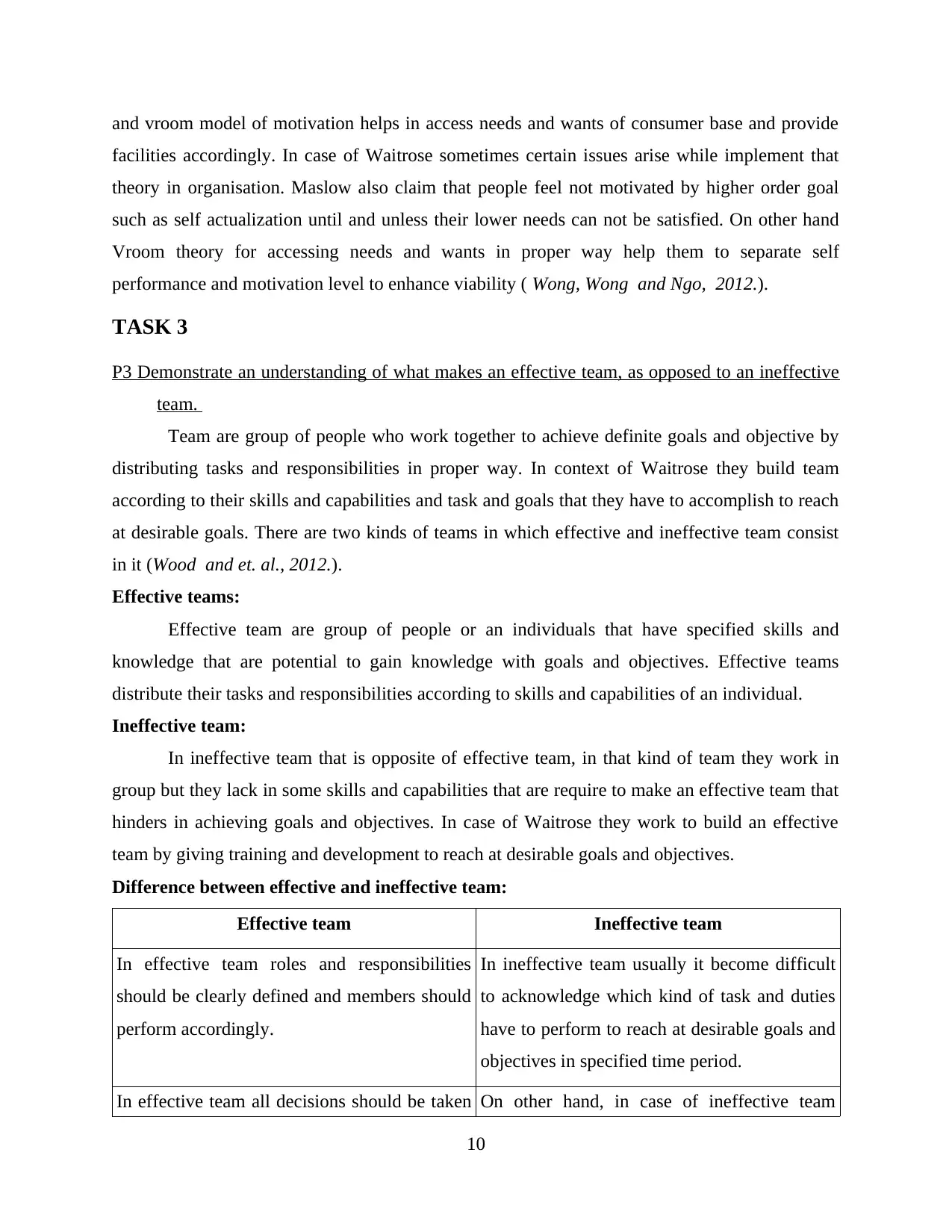
and vroom model of motivation helps in access needs and wants of consumer base and provide
facilities accordingly. In case of Waitrose sometimes certain issues arise while implement that
theory in organisation. Maslow also claim that people feel not motivated by higher order goal
such as self actualization until and unless their lower needs can not be satisfied. On other hand
Vroom theory for accessing needs and wants in proper way help them to separate self
performance and motivation level to enhance viability ( Wong, Wong and Ngo, 2012.).
TASK 3
P3 Demonstrate an understanding of what makes an effective team, as opposed to an ineffective
team.
Team are group of people who work together to achieve definite goals and objective by
distributing tasks and responsibilities in proper way. In context of Waitrose they build team
according to their skills and capabilities and task and goals that they have to accomplish to reach
at desirable goals. There are two kinds of teams in which effective and ineffective team consist
in it (Wood and et. al., 2012.).
Effective teams:
Effective team are group of people or an individuals that have specified skills and
knowledge that are potential to gain knowledge with goals and objectives. Effective teams
distribute their tasks and responsibilities according to skills and capabilities of an individual.
Ineffective team:
In ineffective team that is opposite of effective team, in that kind of team they work in
group but they lack in some skills and capabilities that are require to make an effective team that
hinders in achieving goals and objectives. In case of Waitrose they work to build an effective
team by giving training and development to reach at desirable goals and objectives.
Difference between effective and ineffective team:
Effective team Ineffective team
In effective team roles and responsibilities
should be clearly defined and members should
perform accordingly.
In ineffective team usually it become difficult
to acknowledge which kind of task and duties
have to perform to reach at desirable goals and
objectives in specified time period.
In effective team all decisions should be taken On other hand, in case of ineffective team
10
facilities accordingly. In case of Waitrose sometimes certain issues arise while implement that
theory in organisation. Maslow also claim that people feel not motivated by higher order goal
such as self actualization until and unless their lower needs can not be satisfied. On other hand
Vroom theory for accessing needs and wants in proper way help them to separate self
performance and motivation level to enhance viability ( Wong, Wong and Ngo, 2012.).
TASK 3
P3 Demonstrate an understanding of what makes an effective team, as opposed to an ineffective
team.
Team are group of people who work together to achieve definite goals and objective by
distributing tasks and responsibilities in proper way. In context of Waitrose they build team
according to their skills and capabilities and task and goals that they have to accomplish to reach
at desirable goals. There are two kinds of teams in which effective and ineffective team consist
in it (Wood and et. al., 2012.).
Effective teams:
Effective team are group of people or an individuals that have specified skills and
knowledge that are potential to gain knowledge with goals and objectives. Effective teams
distribute their tasks and responsibilities according to skills and capabilities of an individual.
Ineffective team:
In ineffective team that is opposite of effective team, in that kind of team they work in
group but they lack in some skills and capabilities that are require to make an effective team that
hinders in achieving goals and objectives. In case of Waitrose they work to build an effective
team by giving training and development to reach at desirable goals and objectives.
Difference between effective and ineffective team:
Effective team Ineffective team
In effective team roles and responsibilities
should be clearly defined and members should
perform accordingly.
In ineffective team usually it become difficult
to acknowledge which kind of task and duties
have to perform to reach at desirable goals and
objectives in specified time period.
In effective team all decisions should be taken On other hand, in case of ineffective team
10
Secure Best Marks with AI Grader
Need help grading? Try our AI Grader for instant feedback on your assignments.
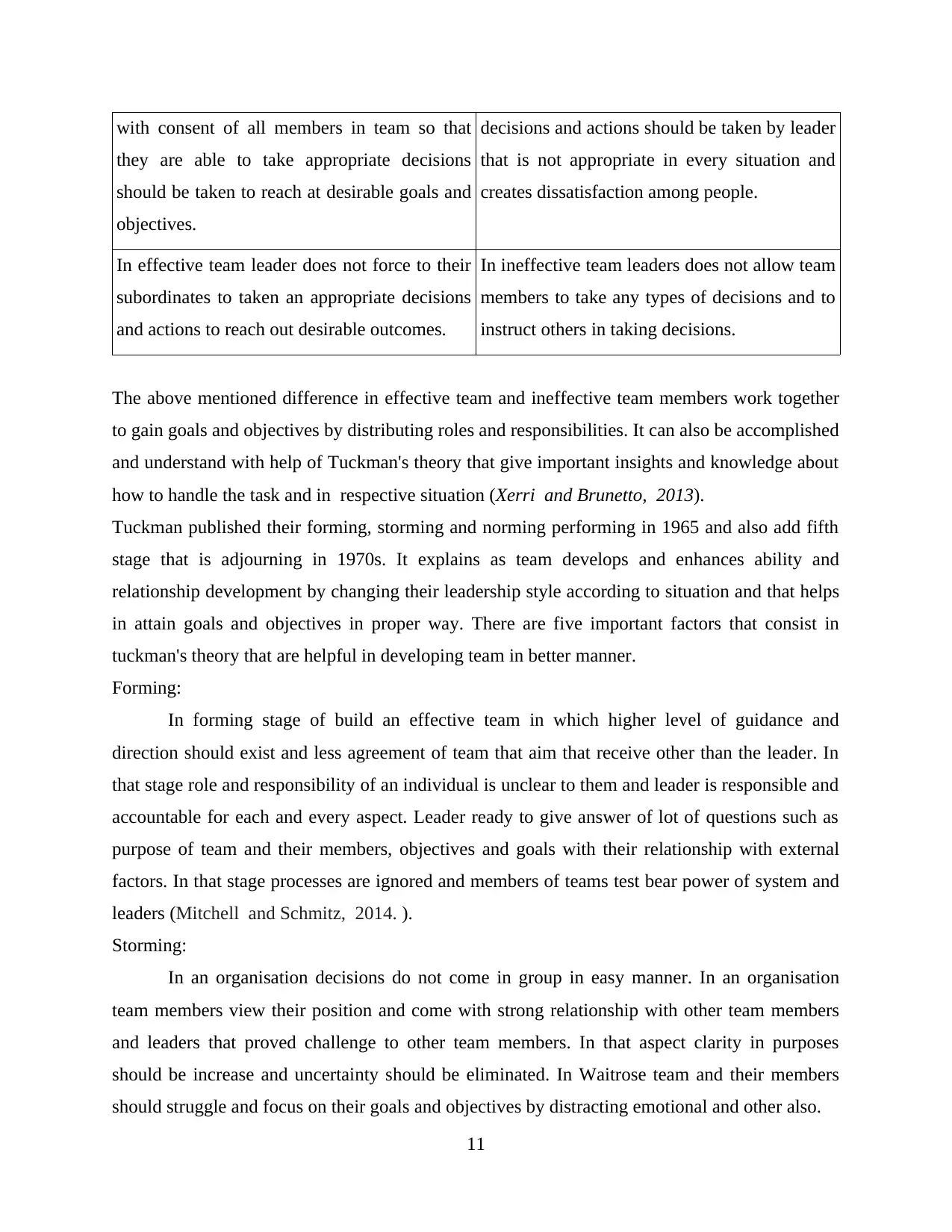
with consent of all members in team so that
they are able to take appropriate decisions
should be taken to reach at desirable goals and
objectives.
decisions and actions should be taken by leader
that is not appropriate in every situation and
creates dissatisfaction among people.
In effective team leader does not force to their
subordinates to taken an appropriate decisions
and actions to reach out desirable outcomes.
In ineffective team leaders does not allow team
members to take any types of decisions and to
instruct others in taking decisions.
The above mentioned difference in effective team and ineffective team members work together
to gain goals and objectives by distributing roles and responsibilities. It can also be accomplished
and understand with help of Tuckman's theory that give important insights and knowledge about
how to handle the task and in respective situation (Xerri and Brunetto, 2013).
Tuckman published their forming, storming and norming performing in 1965 and also add fifth
stage that is adjourning in 1970s. It explains as team develops and enhances ability and
relationship development by changing their leadership style according to situation and that helps
in attain goals and objectives in proper way. There are five important factors that consist in
tuckman's theory that are helpful in developing team in better manner.
Forming:
In forming stage of build an effective team in which higher level of guidance and
direction should exist and less agreement of team that aim that receive other than the leader. In
that stage role and responsibility of an individual is unclear to them and leader is responsible and
accountable for each and every aspect. Leader ready to give answer of lot of questions such as
purpose of team and their members, objectives and goals with their relationship with external
factors. In that stage processes are ignored and members of teams test bear power of system and
leaders (Mitchell and Schmitz, 2014. ).
Storming:
In an organisation decisions do not come in group in easy manner. In an organisation
team members view their position and come with strong relationship with other team members
and leaders that proved challenge to other team members. In that aspect clarity in purposes
should be increase and uncertainty should be eliminated. In Waitrose team and their members
should struggle and focus on their goals and objectives by distracting emotional and other also.
11
they are able to take appropriate decisions
should be taken to reach at desirable goals and
objectives.
decisions and actions should be taken by leader
that is not appropriate in every situation and
creates dissatisfaction among people.
In effective team leader does not force to their
subordinates to taken an appropriate decisions
and actions to reach out desirable outcomes.
In ineffective team leaders does not allow team
members to take any types of decisions and to
instruct others in taking decisions.
The above mentioned difference in effective team and ineffective team members work together
to gain goals and objectives by distributing roles and responsibilities. It can also be accomplished
and understand with help of Tuckman's theory that give important insights and knowledge about
how to handle the task and in respective situation (Xerri and Brunetto, 2013).
Tuckman published their forming, storming and norming performing in 1965 and also add fifth
stage that is adjourning in 1970s. It explains as team develops and enhances ability and
relationship development by changing their leadership style according to situation and that helps
in attain goals and objectives in proper way. There are five important factors that consist in
tuckman's theory that are helpful in developing team in better manner.
Forming:
In forming stage of build an effective team in which higher level of guidance and
direction should exist and less agreement of team that aim that receive other than the leader. In
that stage role and responsibility of an individual is unclear to them and leader is responsible and
accountable for each and every aspect. Leader ready to give answer of lot of questions such as
purpose of team and their members, objectives and goals with their relationship with external
factors. In that stage processes are ignored and members of teams test bear power of system and
leaders (Mitchell and Schmitz, 2014. ).
Storming:
In an organisation decisions do not come in group in easy manner. In an organisation
team members view their position and come with strong relationship with other team members
and leaders that proved challenge to other team members. In that aspect clarity in purposes
should be increase and uncertainty should be eliminated. In Waitrose team and their members
should struggle and focus on their goals and objectives by distracting emotional and other also.
11
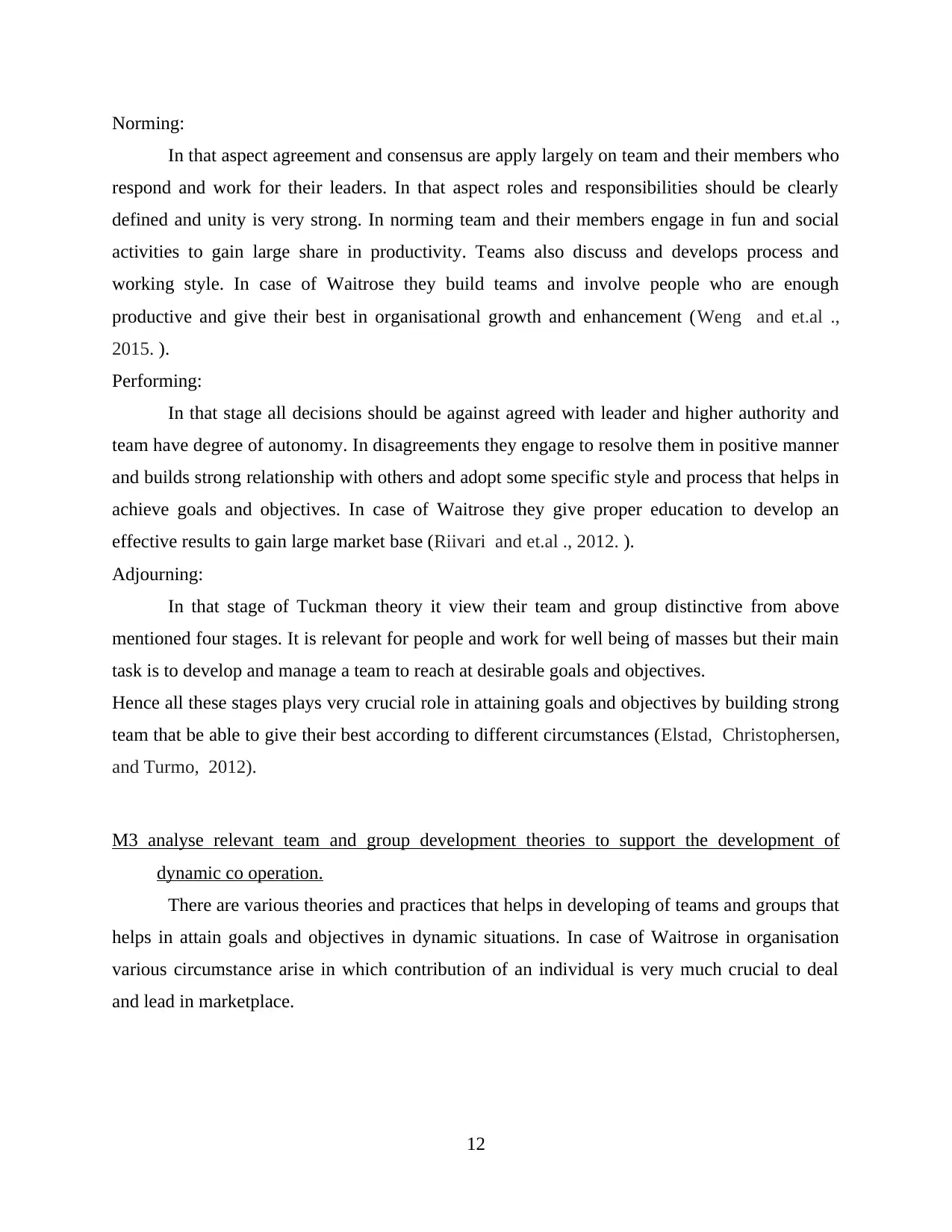
Norming:
In that aspect agreement and consensus are apply largely on team and their members who
respond and work for their leaders. In that aspect roles and responsibilities should be clearly
defined and unity is very strong. In norming team and their members engage in fun and social
activities to gain large share in productivity. Teams also discuss and develops process and
working style. In case of Waitrose they build teams and involve people who are enough
productive and give their best in organisational growth and enhancement (Weng and et.al .,
2015. ).
Performing:
In that stage all decisions should be against agreed with leader and higher authority and
team have degree of autonomy. In disagreements they engage to resolve them in positive manner
and builds strong relationship with others and adopt some specific style and process that helps in
achieve goals and objectives. In case of Waitrose they give proper education to develop an
effective results to gain large market base (Riivari and et.al ., 2012. ).
Adjourning:
In that stage of Tuckman theory it view their team and group distinctive from above
mentioned four stages. It is relevant for people and work for well being of masses but their main
task is to develop and manage a team to reach at desirable goals and objectives.
Hence all these stages plays very crucial role in attaining goals and objectives by building strong
team that be able to give their best according to different circumstances (Elstad, Christophersen,
and Turmo, 2012).
M3 analyse relevant team and group development theories to support the development of
dynamic co operation.
There are various theories and practices that helps in developing of teams and groups that
helps in attain goals and objectives in dynamic situations. In case of Waitrose in organisation
various circumstance arise in which contribution of an individual is very much crucial to deal
and lead in marketplace.
12
In that aspect agreement and consensus are apply largely on team and their members who
respond and work for their leaders. In that aspect roles and responsibilities should be clearly
defined and unity is very strong. In norming team and their members engage in fun and social
activities to gain large share in productivity. Teams also discuss and develops process and
working style. In case of Waitrose they build teams and involve people who are enough
productive and give their best in organisational growth and enhancement (Weng and et.al .,
2015. ).
Performing:
In that stage all decisions should be against agreed with leader and higher authority and
team have degree of autonomy. In disagreements they engage to resolve them in positive manner
and builds strong relationship with others and adopt some specific style and process that helps in
achieve goals and objectives. In case of Waitrose they give proper education to develop an
effective results to gain large market base (Riivari and et.al ., 2012. ).
Adjourning:
In that stage of Tuckman theory it view their team and group distinctive from above
mentioned four stages. It is relevant for people and work for well being of masses but their main
task is to develop and manage a team to reach at desirable goals and objectives.
Hence all these stages plays very crucial role in attaining goals and objectives by building strong
team that be able to give their best according to different circumstances (Elstad, Christophersen,
and Turmo, 2012).
M3 analyse relevant team and group development theories to support the development of
dynamic co operation.
There are various theories and practices that helps in developing of teams and groups that
helps in attain goals and objectives in dynamic situations. In case of Waitrose in organisation
various circumstance arise in which contribution of an individual is very much crucial to deal
and lead in marketplace.
12
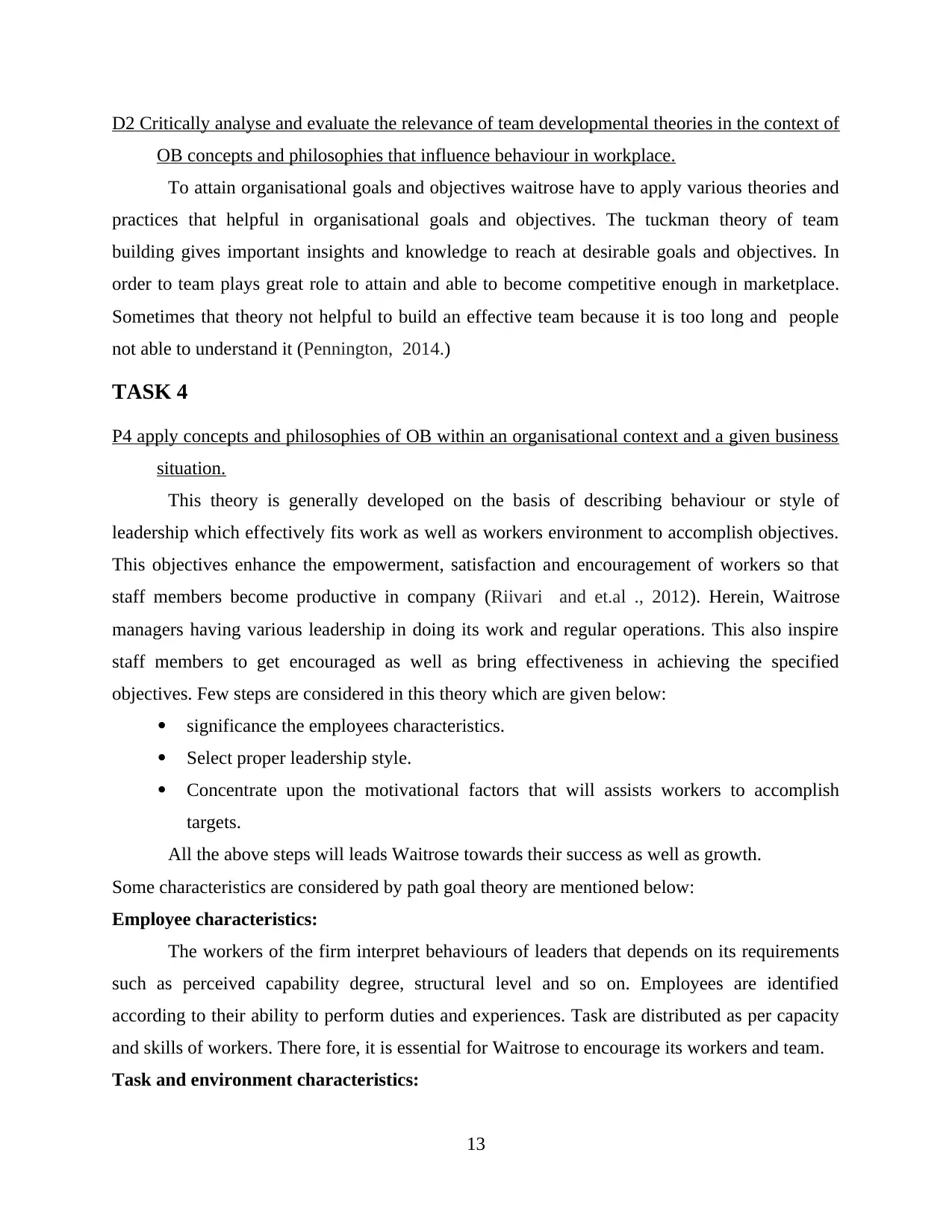
D2 Critically analyse and evaluate the relevance of team developmental theories in the context of
OB concepts and philosophies that influence behaviour in workplace.
To attain organisational goals and objectives waitrose have to apply various theories and
practices that helpful in organisational goals and objectives. The tuckman theory of team
building gives important insights and knowledge to reach at desirable goals and objectives. In
order to team plays great role to attain and able to become competitive enough in marketplace.
Sometimes that theory not helpful to build an effective team because it is too long and people
not able to understand it (Pennington, 2014.)
TASK 4
P4 apply concepts and philosophies of OB within an organisational context and a given business
situation.
This theory is generally developed on the basis of describing behaviour or style of
leadership which effectively fits work as well as workers environment to accomplish objectives.
This objectives enhance the empowerment, satisfaction and encouragement of workers so that
staff members become productive in company (Riivari and et.al ., 2012). Herein, Waitrose
managers having various leadership in doing its work and regular operations. This also inspire
staff members to get encouraged as well as bring effectiveness in achieving the specified
objectives. Few steps are considered in this theory which are given below:
significance the employees characteristics.
Select proper leadership style.
Concentrate upon the motivational factors that will assists workers to accomplish
targets.
All the above steps will leads Waitrose towards their success as well as growth.
Some characteristics are considered by path goal theory are mentioned below:
Employee characteristics:
The workers of the firm interpret behaviours of leaders that depends on its requirements
such as perceived capability degree, structural level and so on. Employees are identified
according to their ability to perform duties and experiences. Task are distributed as per capacity
and skills of workers. There fore, it is essential for Waitrose to encourage its workers and team.
Task and environment characteristics:
13
OB concepts and philosophies that influence behaviour in workplace.
To attain organisational goals and objectives waitrose have to apply various theories and
practices that helpful in organisational goals and objectives. The tuckman theory of team
building gives important insights and knowledge to reach at desirable goals and objectives. In
order to team plays great role to attain and able to become competitive enough in marketplace.
Sometimes that theory not helpful to build an effective team because it is too long and people
not able to understand it (Pennington, 2014.)
TASK 4
P4 apply concepts and philosophies of OB within an organisational context and a given business
situation.
This theory is generally developed on the basis of describing behaviour or style of
leadership which effectively fits work as well as workers environment to accomplish objectives.
This objectives enhance the empowerment, satisfaction and encouragement of workers so that
staff members become productive in company (Riivari and et.al ., 2012). Herein, Waitrose
managers having various leadership in doing its work and regular operations. This also inspire
staff members to get encouraged as well as bring effectiveness in achieving the specified
objectives. Few steps are considered in this theory which are given below:
significance the employees characteristics.
Select proper leadership style.
Concentrate upon the motivational factors that will assists workers to accomplish
targets.
All the above steps will leads Waitrose towards their success as well as growth.
Some characteristics are considered by path goal theory are mentioned below:
Employee characteristics:
The workers of the firm interpret behaviours of leaders that depends on its requirements
such as perceived capability degree, structural level and so on. Employees are identified
according to their ability to perform duties and experiences. Task are distributed as per capacity
and skills of workers. There fore, it is essential for Waitrose to encourage its workers and team.
Task and environment characteristics:
13
Paraphrase This Document
Need a fresh take? Get an instant paraphrase of this document with our AI Paraphraser
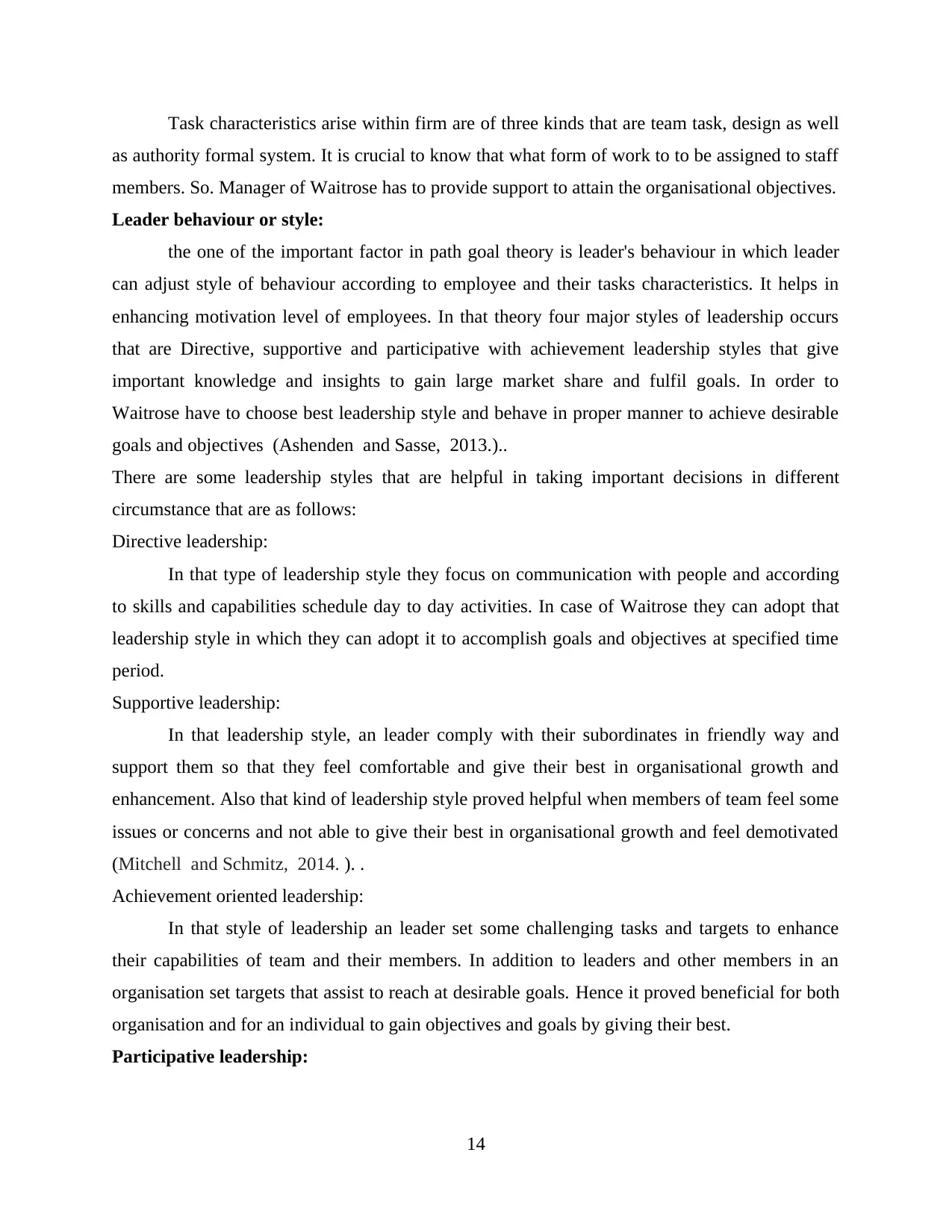
Task characteristics arise within firm are of three kinds that are team task, design as well
as authority formal system. It is crucial to know that what form of work to to be assigned to staff
members. So. Manager of Waitrose has to provide support to attain the organisational objectives.
Leader behaviour or style:
the one of the important factor in path goal theory is leader's behaviour in which leader
can adjust style of behaviour according to employee and their tasks characteristics. It helps in
enhancing motivation level of employees. In that theory four major styles of leadership occurs
that are Directive, supportive and participative with achievement leadership styles that give
important knowledge and insights to gain large market share and fulfil goals. In order to
Waitrose have to choose best leadership style and behave in proper manner to achieve desirable
goals and objectives (Ashenden and Sasse, 2013.)..
There are some leadership styles that are helpful in taking important decisions in different
circumstance that are as follows:
Directive leadership:
In that type of leadership style they focus on communication with people and according
to skills and capabilities schedule day to day activities. In case of Waitrose they can adopt that
leadership style in which they can adopt it to accomplish goals and objectives at specified time
period.
Supportive leadership:
In that leadership style, an leader comply with their subordinates in friendly way and
support them so that they feel comfortable and give their best in organisational growth and
enhancement. Also that kind of leadership style proved helpful when members of team feel some
issues or concerns and not able to give their best in organisational growth and feel demotivated
(Mitchell and Schmitz, 2014. ). .
Achievement oriented leadership:
In that style of leadership an leader set some challenging tasks and targets to enhance
their capabilities of team and their members. In addition to leaders and other members in an
organisation set targets that assist to reach at desirable goals. Hence it proved beneficial for both
organisation and for an individual to gain objectives and goals by giving their best.
Participative leadership:
14
as authority formal system. It is crucial to know that what form of work to to be assigned to staff
members. So. Manager of Waitrose has to provide support to attain the organisational objectives.
Leader behaviour or style:
the one of the important factor in path goal theory is leader's behaviour in which leader
can adjust style of behaviour according to employee and their tasks characteristics. It helps in
enhancing motivation level of employees. In that theory four major styles of leadership occurs
that are Directive, supportive and participative with achievement leadership styles that give
important knowledge and insights to gain large market share and fulfil goals. In order to
Waitrose have to choose best leadership style and behave in proper manner to achieve desirable
goals and objectives (Ashenden and Sasse, 2013.)..
There are some leadership styles that are helpful in taking important decisions in different
circumstance that are as follows:
Directive leadership:
In that type of leadership style they focus on communication with people and according
to skills and capabilities schedule day to day activities. In case of Waitrose they can adopt that
leadership style in which they can adopt it to accomplish goals and objectives at specified time
period.
Supportive leadership:
In that leadership style, an leader comply with their subordinates in friendly way and
support them so that they feel comfortable and give their best in organisational growth and
enhancement. Also that kind of leadership style proved helpful when members of team feel some
issues or concerns and not able to give their best in organisational growth and feel demotivated
(Mitchell and Schmitz, 2014. ). .
Achievement oriented leadership:
In that style of leadership an leader set some challenging tasks and targets to enhance
their capabilities of team and their members. In addition to leaders and other members in an
organisation set targets that assist to reach at desirable goals. Hence it proved beneficial for both
organisation and for an individual to gain objectives and goals by giving their best.
Participative leadership:
14
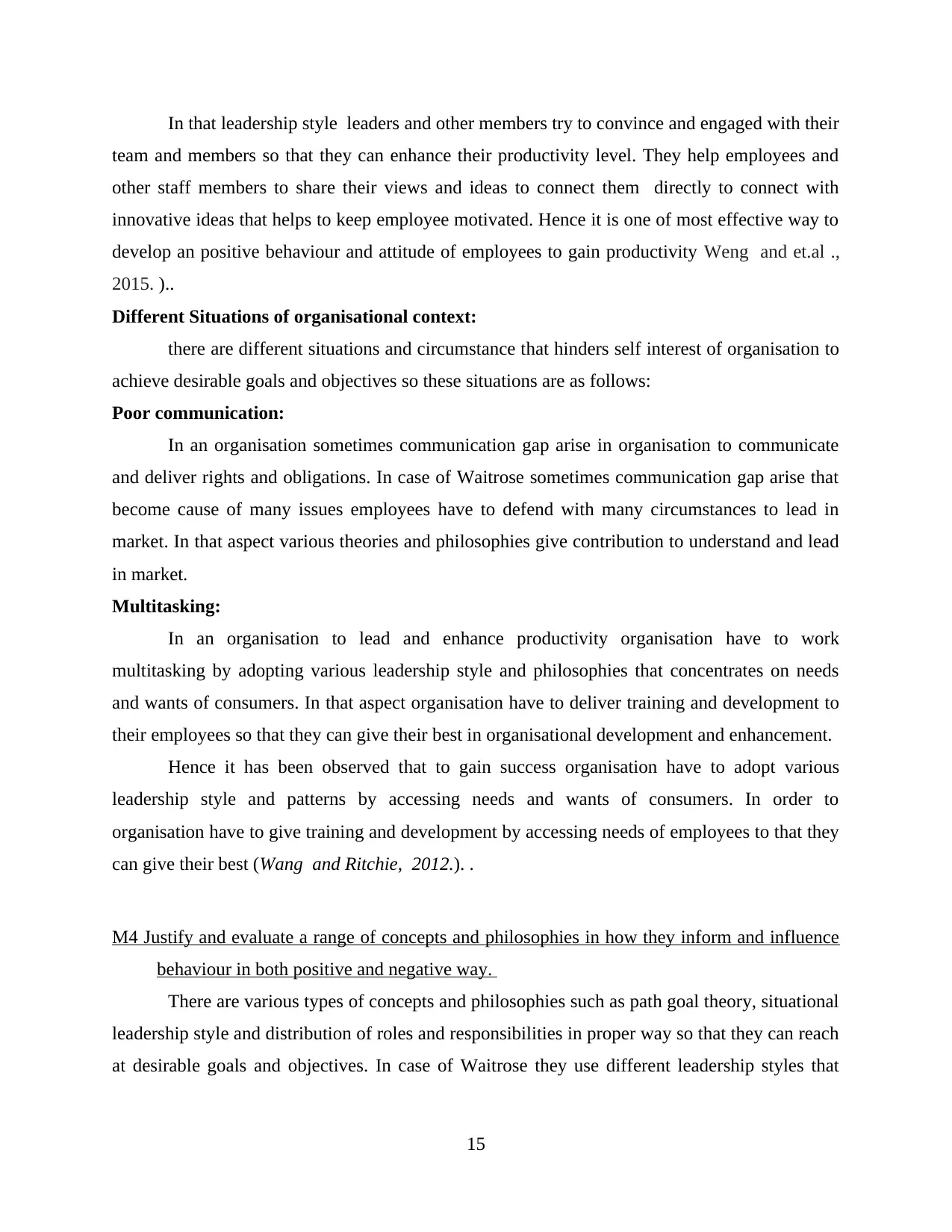
In that leadership style leaders and other members try to convince and engaged with their
team and members so that they can enhance their productivity level. They help employees and
other staff members to share their views and ideas to connect them directly to connect with
innovative ideas that helps to keep employee motivated. Hence it is one of most effective way to
develop an positive behaviour and attitude of employees to gain productivity Weng and et.al .,
2015. )..
Different Situations of organisational context:
there are different situations and circumstance that hinders self interest of organisation to
achieve desirable goals and objectives so these situations are as follows:
Poor communication:
In an organisation sometimes communication gap arise in organisation to communicate
and deliver rights and obligations. In case of Waitrose sometimes communication gap arise that
become cause of many issues employees have to defend with many circumstances to lead in
market. In that aspect various theories and philosophies give contribution to understand and lead
in market.
Multitasking:
In an organisation to lead and enhance productivity organisation have to work
multitasking by adopting various leadership style and philosophies that concentrates on needs
and wants of consumers. In that aspect organisation have to deliver training and development to
their employees so that they can give their best in organisational development and enhancement.
Hence it has been observed that to gain success organisation have to adopt various
leadership style and patterns by accessing needs and wants of consumers. In order to
organisation have to give training and development by accessing needs of employees to that they
can give their best (Wang and Ritchie, 2012.). .
M4 Justify and evaluate a range of concepts and philosophies in how they inform and influence
behaviour in both positive and negative way.
There are various types of concepts and philosophies such as path goal theory, situational
leadership style and distribution of roles and responsibilities in proper way so that they can reach
at desirable goals and objectives. In case of Waitrose they use different leadership styles that
15
team and members so that they can enhance their productivity level. They help employees and
other staff members to share their views and ideas to connect them directly to connect with
innovative ideas that helps to keep employee motivated. Hence it is one of most effective way to
develop an positive behaviour and attitude of employees to gain productivity Weng and et.al .,
2015. )..
Different Situations of organisational context:
there are different situations and circumstance that hinders self interest of organisation to
achieve desirable goals and objectives so these situations are as follows:
Poor communication:
In an organisation sometimes communication gap arise in organisation to communicate
and deliver rights and obligations. In case of Waitrose sometimes communication gap arise that
become cause of many issues employees have to defend with many circumstances to lead in
market. In that aspect various theories and philosophies give contribution to understand and lead
in market.
Multitasking:
In an organisation to lead and enhance productivity organisation have to work
multitasking by adopting various leadership style and philosophies that concentrates on needs
and wants of consumers. In that aspect organisation have to deliver training and development to
their employees so that they can give their best in organisational development and enhancement.
Hence it has been observed that to gain success organisation have to adopt various
leadership style and patterns by accessing needs and wants of consumers. In order to
organisation have to give training and development by accessing needs of employees to that they
can give their best (Wang and Ritchie, 2012.). .
M4 Justify and evaluate a range of concepts and philosophies in how they inform and influence
behaviour in both positive and negative way.
There are various types of concepts and philosophies such as path goal theory, situational
leadership style and distribution of roles and responsibilities in proper way so that they can reach
at desirable goals and objectives. In case of Waitrose they use different leadership styles that
15
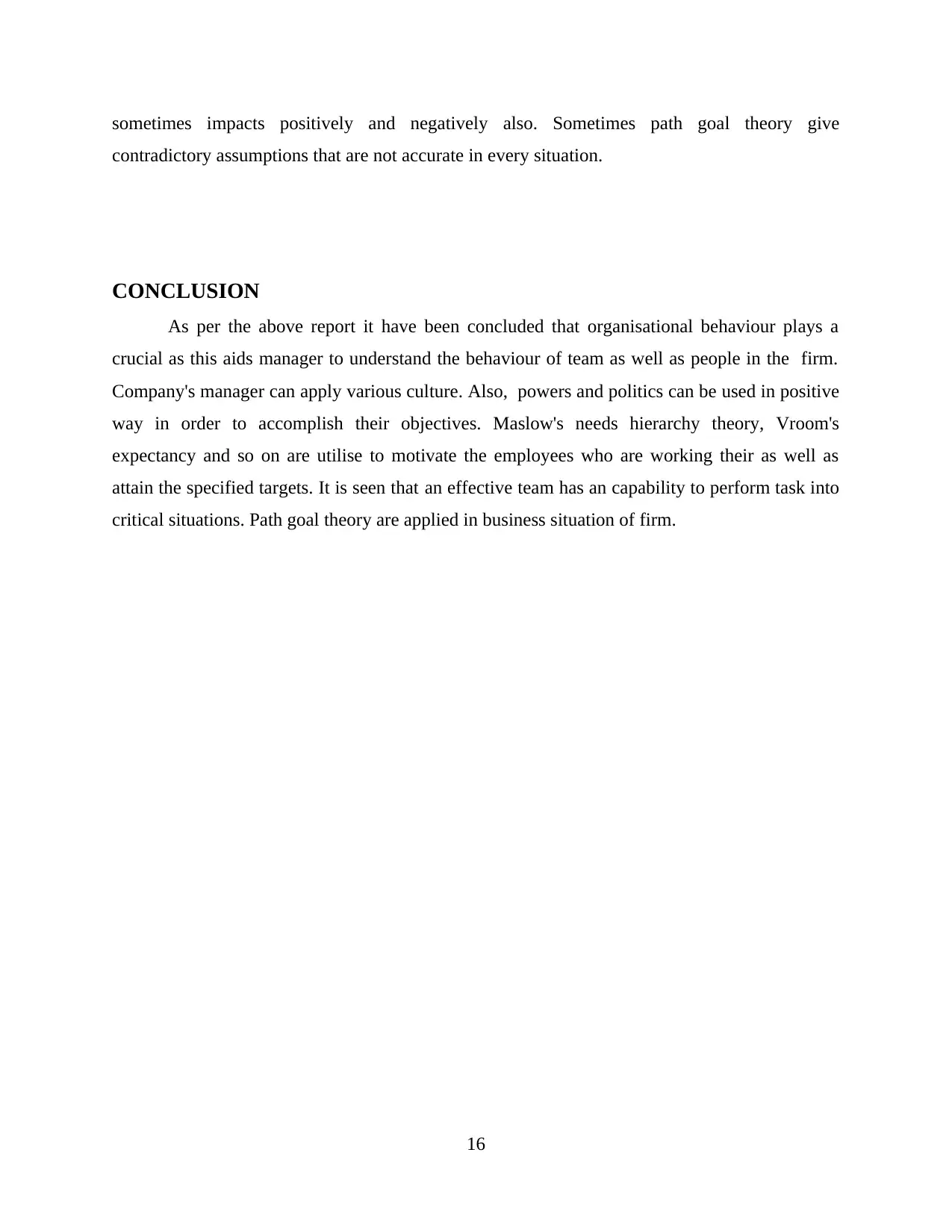
sometimes impacts positively and negatively also. Sometimes path goal theory give
contradictory assumptions that are not accurate in every situation.
CONCLUSION
As per the above report it have been concluded that organisational behaviour plays a
crucial as this aids manager to understand the behaviour of team as well as people in the firm.
Company's manager can apply various culture. Also, powers and politics can be used in positive
way in order to accomplish their objectives. Maslow's needs hierarchy theory, Vroom's
expectancy and so on are utilise to motivate the employees who are working their as well as
attain the specified targets. It is seen that an effective team has an capability to perform task into
critical situations. Path goal theory are applied in business situation of firm.
16
contradictory assumptions that are not accurate in every situation.
CONCLUSION
As per the above report it have been concluded that organisational behaviour plays a
crucial as this aids manager to understand the behaviour of team as well as people in the firm.
Company's manager can apply various culture. Also, powers and politics can be used in positive
way in order to accomplish their objectives. Maslow's needs hierarchy theory, Vroom's
expectancy and so on are utilise to motivate the employees who are working their as well as
attain the specified targets. It is seen that an effective team has an capability to perform task into
critical situations. Path goal theory are applied in business situation of firm.
16
Secure Best Marks with AI Grader
Need help grading? Try our AI Grader for instant feedback on your assignments.
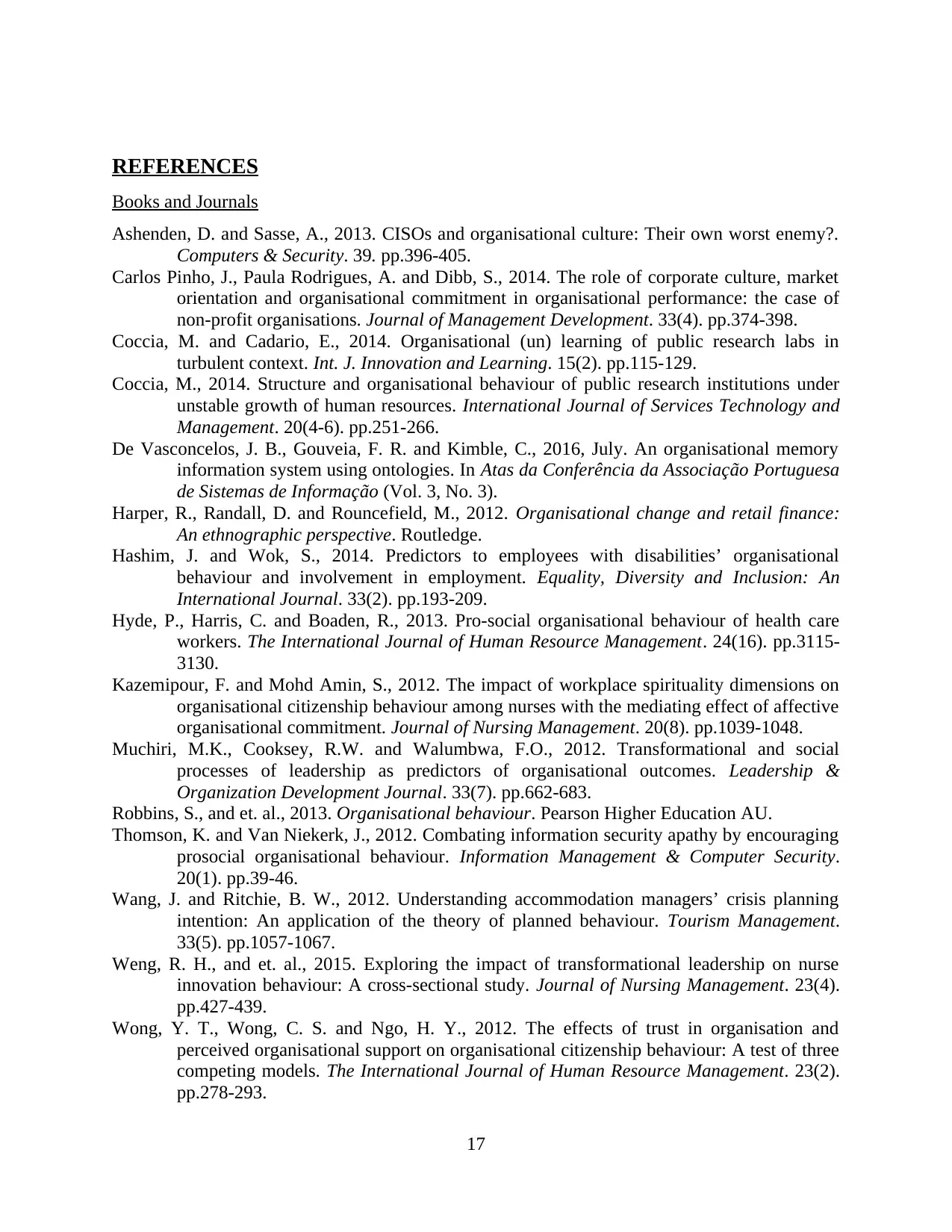
REFERENCES
Books and Journals
Ashenden, D. and Sasse, A., 2013. CISOs and organisational culture: Their own worst enemy?.
Computers & Security. 39. pp.396-405.
Carlos Pinho, J., Paula Rodrigues, A. and Dibb, S., 2014. The role of corporate culture, market
orientation and organisational commitment in organisational performance: the case of
non-profit organisations. Journal of Management Development. 33(4). pp.374-398.
Coccia, M. and Cadario, E., 2014. Organisational (un) learning of public research labs in
turbulent context. Int. J. Innovation and Learning. 15(2). pp.115-129.
Coccia, M., 2014. Structure and organisational behaviour of public research institutions under
unstable growth of human resources. International Journal of Services Technology and
Management. 20(4-6). pp.251-266.
De Vasconcelos, J. B., Gouveia, F. R. and Kimble, C., 2016, July. An organisational memory
information system using ontologies. In Atas da Conferência da Associação Portuguesa
de Sistemas de Informação (Vol. 3, No. 3).
Harper, R., Randall, D. and Rouncefield, M., 2012. Organisational change and retail finance:
An ethnographic perspective. Routledge.
Hashim, J. and Wok, S., 2014. Predictors to employees with disabilities’ organisational
behaviour and involvement in employment. Equality, Diversity and Inclusion: An
International Journal. 33(2). pp.193-209.
Hyde, P., Harris, C. and Boaden, R., 2013. Pro-social organisational behaviour of health care
workers. The International Journal of Human Resource Management. 24(16). pp.3115-
3130.
Kazemipour, F. and Mohd Amin, S., 2012. The impact of workplace spirituality dimensions on
organisational citizenship behaviour among nurses with the mediating effect of affective
organisational commitment. Journal of Nursing Management. 20(8). pp.1039-1048.
Muchiri, M.K., Cooksey, R.W. and Walumbwa, F.O., 2012. Transformational and social
processes of leadership as predictors of organisational outcomes. Leadership &
Organization Development Journal. 33(7). pp.662-683.
Robbins, S., and et. al., 2013. Organisational behaviour. Pearson Higher Education AU.
Thomson, K. and Van Niekerk, J., 2012. Combating information security apathy by encouraging
prosocial organisational behaviour. Information Management & Computer Security.
20(1). pp.39-46.
Wang, J. and Ritchie, B. W., 2012. Understanding accommodation managers’ crisis planning
intention: An application of the theory of planned behaviour. Tourism Management.
33(5). pp.1057-1067.
Weng, R. H., and et. al., 2015. Exploring the impact of transformational leadership on nurse
innovation behaviour: A cross‐sectional study. Journal of Nursing Management. 23(4).
pp.427-439.
Wong, Y. T., Wong, C. S. and Ngo, H. Y., 2012. The effects of trust in organisation and
perceived organisational support on organisational citizenship behaviour: A test of three
competing models. The International Journal of Human Resource Management. 23(2).
pp.278-293.
17
Books and Journals
Ashenden, D. and Sasse, A., 2013. CISOs and organisational culture: Their own worst enemy?.
Computers & Security. 39. pp.396-405.
Carlos Pinho, J., Paula Rodrigues, A. and Dibb, S., 2014. The role of corporate culture, market
orientation and organisational commitment in organisational performance: the case of
non-profit organisations. Journal of Management Development. 33(4). pp.374-398.
Coccia, M. and Cadario, E., 2014. Organisational (un) learning of public research labs in
turbulent context. Int. J. Innovation and Learning. 15(2). pp.115-129.
Coccia, M., 2014. Structure and organisational behaviour of public research institutions under
unstable growth of human resources. International Journal of Services Technology and
Management. 20(4-6). pp.251-266.
De Vasconcelos, J. B., Gouveia, F. R. and Kimble, C., 2016, July. An organisational memory
information system using ontologies. In Atas da Conferência da Associação Portuguesa
de Sistemas de Informação (Vol. 3, No. 3).
Harper, R., Randall, D. and Rouncefield, M., 2012. Organisational change and retail finance:
An ethnographic perspective. Routledge.
Hashim, J. and Wok, S., 2014. Predictors to employees with disabilities’ organisational
behaviour and involvement in employment. Equality, Diversity and Inclusion: An
International Journal. 33(2). pp.193-209.
Hyde, P., Harris, C. and Boaden, R., 2013. Pro-social organisational behaviour of health care
workers. The International Journal of Human Resource Management. 24(16). pp.3115-
3130.
Kazemipour, F. and Mohd Amin, S., 2012. The impact of workplace spirituality dimensions on
organisational citizenship behaviour among nurses with the mediating effect of affective
organisational commitment. Journal of Nursing Management. 20(8). pp.1039-1048.
Muchiri, M.K., Cooksey, R.W. and Walumbwa, F.O., 2012. Transformational and social
processes of leadership as predictors of organisational outcomes. Leadership &
Organization Development Journal. 33(7). pp.662-683.
Robbins, S., and et. al., 2013. Organisational behaviour. Pearson Higher Education AU.
Thomson, K. and Van Niekerk, J., 2012. Combating information security apathy by encouraging
prosocial organisational behaviour. Information Management & Computer Security.
20(1). pp.39-46.
Wang, J. and Ritchie, B. W., 2012. Understanding accommodation managers’ crisis planning
intention: An application of the theory of planned behaviour. Tourism Management.
33(5). pp.1057-1067.
Weng, R. H., and et. al., 2015. Exploring the impact of transformational leadership on nurse
innovation behaviour: A cross‐sectional study. Journal of Nursing Management. 23(4).
pp.427-439.
Wong, Y. T., Wong, C. S. and Ngo, H. Y., 2012. The effects of trust in organisation and
perceived organisational support on organisational citizenship behaviour: A test of three
competing models. The International Journal of Human Resource Management. 23(2).
pp.278-293.
17
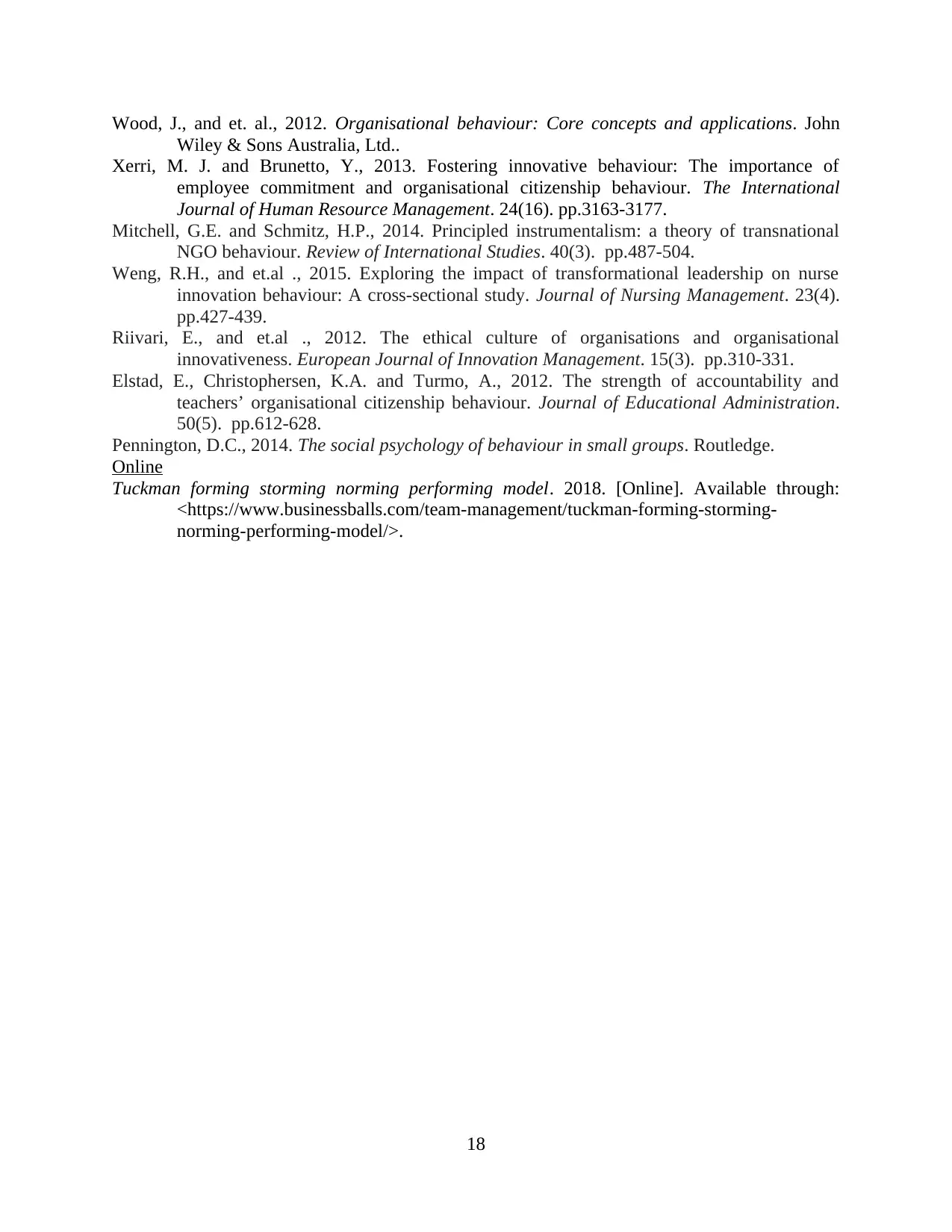
Wood, J., and et. al., 2012. Organisational behaviour: Core concepts and applications. John
Wiley & Sons Australia, Ltd..
Xerri, M. J. and Brunetto, Y., 2013. Fostering innovative behaviour: The importance of
employee commitment and organisational citizenship behaviour. The International
Journal of Human Resource Management. 24(16). pp.3163-3177.
Mitchell, G.E. and Schmitz, H.P., 2014. Principled instrumentalism: a theory of transnational
NGO behaviour. Review of International Studies. 40(3). pp.487-504.
Weng, R.H., and et.al ., 2015. Exploring the impact of transformational leadership on nurse
innovation behaviour: A cross‐sectional study. Journal of Nursing Management. 23(4).
pp.427-439.
Riivari, E., and et.al ., 2012. The ethical culture of organisations and organisational
innovativeness. European Journal of Innovation Management. 15(3). pp.310-331.
Elstad, E., Christophersen, K.A. and Turmo, A., 2012. The strength of accountability and
teachers’ organisational citizenship behaviour. Journal of Educational Administration.
50(5). pp.612-628.
Pennington, D.C., 2014. The social psychology of behaviour in small groups. Routledge.
Online
Tuckman forming storming norming performing model. 2018. [Online]. Available through:
<https://www.businessballs.com/team-management/tuckman-forming-storming-
norming-performing-model/>.
18
Wiley & Sons Australia, Ltd..
Xerri, M. J. and Brunetto, Y., 2013. Fostering innovative behaviour: The importance of
employee commitment and organisational citizenship behaviour. The International
Journal of Human Resource Management. 24(16). pp.3163-3177.
Mitchell, G.E. and Schmitz, H.P., 2014. Principled instrumentalism: a theory of transnational
NGO behaviour. Review of International Studies. 40(3). pp.487-504.
Weng, R.H., and et.al ., 2015. Exploring the impact of transformational leadership on nurse
innovation behaviour: A cross‐sectional study. Journal of Nursing Management. 23(4).
pp.427-439.
Riivari, E., and et.al ., 2012. The ethical culture of organisations and organisational
innovativeness. European Journal of Innovation Management. 15(3). pp.310-331.
Elstad, E., Christophersen, K.A. and Turmo, A., 2012. The strength of accountability and
teachers’ organisational citizenship behaviour. Journal of Educational Administration.
50(5). pp.612-628.
Pennington, D.C., 2014. The social psychology of behaviour in small groups. Routledge.
Online
Tuckman forming storming norming performing model. 2018. [Online]. Available through:
<https://www.businessballs.com/team-management/tuckman-forming-storming-
norming-performing-model/>.
18
1 out of 18
Related Documents
Your All-in-One AI-Powered Toolkit for Academic Success.
+13062052269
info@desklib.com
Available 24*7 on WhatsApp / Email
![[object Object]](/_next/static/media/star-bottom.7253800d.svg)
Unlock your academic potential
© 2024 | Zucol Services PVT LTD | All rights reserved.





